Meritorious Awards
 2025 Recipient of the Judah Folkman Award in Vascular Biology
2025 Recipient of the Judah Folkman Award in Vascular Biology
The NAVBO Meritorious Awards Committee, the Scientific Advisory Board, and the NAVBO Council announce with pleasure the selection of Yajaira Suárez, PhD, as the recipient of the 2025 Judah Folkman Award in Vascular Biology. This award recognizes outstanding contributions from vascular biologists who are at mid-career (within fifteen years of their first faculty appointment). Dr. Suárez will present the Folkman Award Lecture and receive the award at Vascular Biology 2025 in Hyannis, Massachusetts (October 19 - 23, 2025).
After completing her undergraduate degree in Biology at the Universidad Autónoma de Madrid, Dr. Suárez earned a PhD in Biochemistry/Molecular Biology from the same institution in 2001. She pursued post-doctoral research with Alberto Muñoz at the Instituto de Investigaciones Biomédicas, Consejo Superior de Investigaciones Científicas in Madrid and subsequently with Jordan Pober and Bill Sessa at Yale. She held research and junior faculty positions at NYU starting in 2009, returning to Yale as an Assistant Professor in 2013. She is currently Anthony N. Brady Professor of Comparative Medicine and Pathology at the Yale University School of Medicine.
Research in Dr. Suárez’s laboratory seeks to elucidate mechanisms involved in the regulation of endothelial cell and macrophage function. Both cell types play major roles in angiogenesis and inflammation responses in the context of atherosclerosis, tumor growth and metastasis, adipose tissue expansion, and wound healing. Her lab, employing approaches that combining molecular and cellular biology, biochemistry, and genetically modified mouse models, focuses in four different areas: 1) the role of non-coding RNAs on endothelial cell and macrophage responses to cytokines and growth factors; 2) endothelial metabolic rewiring; 3) the relationship between macrophage inflammatory responses and metabolic regulation (immunometabolism); and 4) regulation of cholesterol and lipoprotein metabolism in cardiometabolic diseases. Her lab’s contributions in all of these areas have been impactful. For example, her studies of microRNAs in regulating endothelial angiogenic and inflammatory activation during post-natal angiogenesis are credited with opening a new area of investigation in vascular cell biology, thus having a profound scientific impact. She has earned numerous awards in the US and internationally, over a dozen students, and has published well over 100 peer-reviewed papers and book chapters.
Colleagues writing in support of Dr. Suárez’s nomination for the Folkman Award note not only her success to date but her promising trajectory as a scientist, valued collaborator, mentor, and leader in her institutional community. In the spirit of the award’s namesake, “her exceptional contributions to vascular biology have not only advanced scientific knowledge but have also inspired peers and future generations alike.” Please join us at VB2025 this October to honor Dr. Suárez as she receives the Folkman Award in recognition of her accomplishments as a vascular biologist.
FEBRUARY 24, 1933 – JANUARY 14, 2008
JUDAH FOLKMAN AWARD IN VASCULAR BIOLOGY PRESENTED BY NAVBO
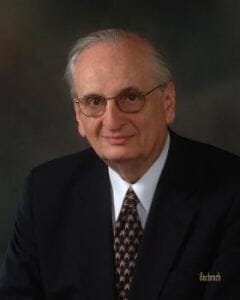
The Judah Folkman Award is a mid-career award. At the time of the Award, nominees will be between 3 and 15 years of their first faculty appointment (Assistant Professor or in non-academia, Staff Scientist or equivalent).
In recognition of the breadth of Dr. Folkman's interests and his many contributions to vascular biology, the award will not be limited to the field of angiogenesis per se, but will encompass the full range of original research in vascular biology. Awardee will have made a significant impact on the field through their original research accomplishments.
Past Recipients include:
 2024 Recipient of the Judah Folkman Award in Vascular Biology
2024 Recipient of the Judah Folkman Award in Vascular Biology
The NAVBO Meritorious Awards Committee and the NAVBO Council announce with pleasure the selection of Benjamin Hogan, PhD, as the recipient of the 2024 Judah Folkman Award in Vascular Biology. This award recognizes outstanding contributions from vascular biologists who are at mid-career (within fifteen years of their first faculty appointment). Dr. Hogan will present the Folkman Award Lecture and receive the award at Vascular Biology 2024 in Pacific Grove, California (October 20 - 24, 2024).
After completing his undergraduate degree in Genetics at the University of Melbourne, Dr. Hogan earned a PhD in Developmental Genetics from the same institution in 2005. He pursued post-doctoral research at the Ludwig Institute for Cancer Research in Melbourne and the Hubrecht Institute for Developmental and Stem Cell Biology, Utrecht, The Netherlands. He returned to Australia as a Junior Faculty member in the Institute for Molecular Bioscience at the University of Queensland, rising to Division Head in 2015. Since 2019, he has been Professor in the Department of Anatomy and Physiology at the University of Melbourne and Co-Head of the Program in Organogenesis and Cancer at Melbourne’s Peter MacCallum Cancer Centre.
Research in Dr. Hogan’s laboratory focuses on discovery of molecular mechanisms of lymphatic vessel development and their contribution in lymphoedema and diseases including cancer. His work has utilized and developed the zebrafish model in lymphatic research, and he has confirmed key discoveries using mouse and human endothelial models. Much of his work has utilized large-scale phenotype-based genetic screens in zebrafish, to discover key genes and molecular mechanisms in lymphangiogenesis. Current work in his lab includes studies of lymphangiogenesis, blood brain barrier function and novel approaches to model endothelial cell-tumor interactions. Collectively, these investigations have characterized several new molecular components and downstream effectors in the VEGFC/VEGFR3 signaling cascade, advancing our understanding of this VEGF family growth factor/ receptor pathway, its targets and regulation in lymphangiogenesis. Dr. Hogan’s research has been well-supported by fellowships and grants from EMBO, the Australian Research Council and the National Health and Medical Research Council. His work has generated 85+ peer-reviewed papers, reviews and book chapters. He has received numerous awards in recognition of his many scientific contributions, including Researcher of the Year Award from the National Heart Foundation Australia (Queensland) in 2015 and an Emerging Leader Award from the Australia-New Zealand Society for Cell and Developmental Biology in 2016
Colleagues writing in support of Dr. Hogan’s nomination for the Folkman Award all note his pioneering work using zebrafish as an experimental model for study of vascular development and function, producing, as one writes, work that “…stands out for its boldness, its rigor, and its enormous impact.” Another recommender celebrates his passion “…for training the next generation of scientists and for translating his discovery research to clinical applications that improve outcomes for patients of vascular disease.” And beyond the many scientific achievements, Dr. Hogan has impressed his colleagues with an “…open-minded, friendly and inclusive attitude make him a highly valued and positive member of the vascular biology community.”
Please join us at VB2024 this October to honor Dr. Hogan as he receives the Folkman Award in recognition of his accomplishments…and bright future…as a vascular biologist.
 2023 Recipient of the Judah Folkman Award in Vascular Biology
2023 Recipient of the Judah Folkman Award in Vascular Biology
The NAVBO Meritorious Awards Committee, the Scientific Advisory Board, and the NAVBO Council announce with pleasure the selection of Michael Potente, MD, as the recipient of the 2023 Judah Folkman Award in Vascular Biology. This award recognizes outstanding contributions from vascular biologists who are at mid-career (within fifteen years of their first faculty appointment). Dr. Potente will present his Folkman Award Lecture, "Metabolic guidance of angiogenesis: principles and mechanisms," and receive the award at Vascular Biology 2023 in Newport, Rhode Island (October 15-19, 2023).
Dr. Potente received his medical degree from Goethe-University in Frankfurt, Germany, in 2003 and subsequently pursued a Cardiology residency as well as postdoctoral training under Stefanie Dimmeler at the Institute of Cardiovascular Regeneration at Goethe-University. Following several years of clinical cardiology practice, he became Max Planck Research Group Leader at the Max Planck Institute for Heart and Lung Research in Bad Nauheim in 2012 and served as a Visiting Professor at the Max Delbrueck Center in Berlin from 2016-2019. Since 2020, he has held the position of Professor and practicing Physician/Cardiologist in the Berlin Institute of Health at Charité – Universitätsmedizin Berlin, and the Max Delbrück Center for Molecular Medicine.
Research in Dr. Potente’s Angiogenesis and Metabolism Laboratory at the Max Planck Institute is focused on understanding the role of intermediary metabolism in the regulation of angiogenesis, or how environmental cues affect vascular dynamics in health and disease. Of particular interest are the metabolic adaptations, governed by transcriptional mechanisms, required for endothelial cells to adopt a proliferative, migratory phenotype during an angiogenic response. This work has revealed that well-recognized pathways of endothelial cell differentiation and function, such as those involving Notch signaling, can be influenced in significant ways by the metabolic state of the cell. Dr. Potente’s work has been consistently supported throughout his independent research career by a variety of public and foundation sponsors and has earned him a number of awards in Germany and internationally. He has authored more than 50 research publications, reviews, and editorials to date.
A colleague writing in support of Dr. Potente’s nomination for the Folkman Award notes that he “…is innovative and has a very deep understanding of signaling pathways that guide vessel growth.” Further, beyond his impactful contributions to vascular biology, “…he is a role model for physician scientists how to combine strong basic science without losing the contact to patients.” Perhaps most importantly, another letter of support states that Dr. Potente is “…a most worthy and suitable candidate for the NAVBO Judah Folkman award. Like Folkman, Michael has a medical background, combined with a deep and fundamental curiosity and love for mechanistic discovery science.”
Please join us at VB2023 this October to honor Dr. Potente as he receives the Folkman Award in recognition of his accomplishments…and bright future…as a vascular biologist.
 2022 Recipient of the Judah Folkman Award in Vascular Biology
2022 Recipient of the Judah Folkman Award in Vascular Biology
The NAVBO Meritorious Awards Committee, the Scientific Advisory Board, and the NAVBO Council announce with pleasure the selection of Stefania Nicoli, PhD, as the recipient of the 2022 Judah Folkman Award in Vascular Biology. This award recognizes outstanding contributions from vascular biologists who are at mid-career (within fifteen years of their first faculty appointment). Dr. Nicoli will present her Folkman Award Lecture, tentatively titled, "RNA based mechanisms guiding endothelial cell behaviors," and receive the award at IVBM 2022 in San Francisco, California, October 15, 2022.
Dr. Nicoli received a Bachelor’s degree in Pharmaceutical Biotechnology from University of Milan in 2003 and a PhD in Biomedical Biotechnology in 2007 from the University of Brescia. Following post-doctoral studies at the UMASS Medical School with Nathan Lawson, she joined the faculty of the Department of Internal Medicine/Cardiology at Yale University School of Medicine in 2012 as an Assistant Professor. She was promoted in 2018 to Associate Professor in Genetics and Internal Medicine/Cardiology, and currently serves as Director of the Yale Zebrafish Phenotyping Core for Precision Medicine and Co-Director of the Yale Cardiovascular Research Center.
Dr. Nicoli and her colleagues have been pioneers in the use of Zebrafish models to understand how small non-coding RNAs coordinate cardiovascular and neuronal development and how these processes may be compromised in diseases such as cancer, atherosclerosis, and stroke. Exploiting the conservation of mechanisms that govern blood vessel formation in humans and Zebrafish, Dr. Nicoli’s studies have yielded novel insights on vascular development and function. microRNAs (miRNAs), highly conserved non-coding small RNAs that post-transcriptionally regulate gene expression, function in a number of different biological processes, including cardiogenesis, muscle development, oncogenesis, brain morphogenesis, and hematopoiesis. The Nicoli lab recently reported that microRNAs are required to maintain the homeostatic level of glycans at the cell surface of the endothelium as a mechanism to regulate hemogenic and hematopoietic fate. These findings suggest the presence of post- transcriptional mechanisms that dictate embryonic hematopoiesis and may control the heterogeneity of endothelial cell behaviors. Other areas of research focus in Dr. Nicoli’s lab include identification of genetic signaling pathways that direct normal vessel formation and identification of mechanisms that build the neurovascular system.
Dr. Nicoli has published upwards of 29 peer-reviewed papers in top-notch journals, as well as numerous reviews, editorials, and book chapters. She has built an extraordinary record of research funding and is highly in demand as a speaker, with ~40 invited presentations since 2010. Writing in support of Dr. Nicoli’s nomination for the Folkman Award, her professional colleagues note that she “…is a superb colleague and role model. Her work is always of the highest quality, is highly innovative, with extraordinary mechanistic depth and breadth, driving discovery of new biological paradigms and phenomena.” And from another nominator: “Her work represents a fearless approach that spans many aspects of endothelial cell and vascular biology that are less investigated. In addition to its intellectual importance, her work demonstrates a level of innovation and creativity that is very unusual for any investigator, but especially for a fairly young investigator. I consider her a new leader in the field and someone highly deserving of the Judah Folkman Award.” Finally, her early promise as a researcher was recognized by NAVBO, which awarded Dr. Nicoli the Springer Junior Investigator Award in 2016.
Please join us at IVMB2022 this October to honor Dr. Nicoli as she receives the Folkman Award in recognition of her accomplishments…and bright future…as a vascular biologist.
2021 NAVBO JUDAH FOLKMAN AWARD IN VASCULAR BIOLOGY - CARLOS FERNÁNDEZ-HERNANDO, M.S., PH.D., YALE UNIVERSITY SCHOOL OF MEDICINE
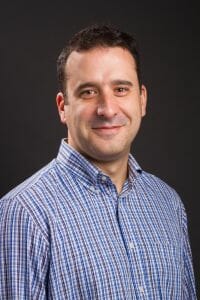
The NAVBO Meritorious Awards Committee, the Scientific Advisory Board, and the NAVBO Council announce with pleasure the selection of Carlos Fernández-Hernando, PhD, as the recipient of the 2021 Judah Folkman Award in Vascular Biology. This award recognizes outstanding contributions from vascular biologists who are at mid-career (within fifteen years of their first faculty appointment). Dr. Fernández-Hernando will present his Folkman Award Lecture and receive the award online on November 4 at 1:00pmET. Click here to register.
Dr. Fernández-Hernando earned a BSc in Chemistry (1998) and a PhD in Biochemistry and Molecular Biology (2003) from Universidad Autónoma de Madrid in Spain. Following post-doctoral work at Hospital Ramón y Cajal, Spain, and Yale University School of Medicine, he joined the faculty of the NYU School of Medicine in 2009. He moved to Yale as an Associate Professor in the Department of Comparative Medicine and the Interdepartmental Program in Vascular Biology and Therapeutics in 2013. Since 2019, he has held the position of Professor in Yale’s Departments of Comparative Medicine and Pathology, with continuing roles in the Programs in VBT and Integrative Cell Signaling & Neurobiology Metabolism.
Dr. Fernández-Hernando’s early research focused on the study of cellular cholesterol homeostasis in regulating cell cycle progression and cellular proliferation. His postdoctoral research in Vascular Biology and Pharmacology at Yale University School of Medicine examined the molecular mechanisms that control lipoprotein transport across the endothelium during atherosclerosis and the regulation of eNOS activity. During his time at Yale, he and Dr. Suárez accomplished in Bill Sessa’s lab the first identification and characterization of miRNAs as major regulators of endothelial cell biology and angiogenesis.
As an Assistant Professor of Medicine (Cardiology) and Cell Biology and the Vascular Biology and Disease Program at NYU, his group published a landmark paper in Science reporting discovery of a small RNA (miR-33) that regulates cholesterol and fatty acid metabolism. In a series of key studies, he was able to demonstrate that miRNA-33 provides a critical link between the regulation of cholesterol biosynthesis by SREBP2 and cholesterol efflux pathways mediated by ABCA1, a transporter that controls cellular cholesterol efflux and high-density lipoprotein (HDL) biogenesis. This important discovery represents one of the first examples where a miRNA cooperates with its host gene to regulate a similar physiological process. In addition to miRNA-33, his lab has also identified a number of other relevant miRNAs (miR-144, miR-27 and miR-148a) involved in the regulation of lipoprotein metabolism and cholesterol homeostasis.
Other research in his lab examines the contribution of cholesterol biosynthetic intermediates and cholesterol derivatives in regulating macrophage immune response during atherosclerosis and type-2 diabetes. This work has identified desmosterol as the natural LXR ligand that regulates cholesterol metabolism and inflammasome activation in atherosclerotic vascular disease. His research group has also begun to dissect the contribution of ANGPTL proteins in regulating angiogenesis and lipid metabolism. In a number of related studies, his lab has demonstrated that ANGPTL4 influences the progression of atherosclerosis by affecting macrophage foam cell formation in atherosclerotic plaques and accelerating the catabolism of triglyceride rich lipoproteins.
The research described above, featured in over 100 peer-reviewed papers published to date, has established Dr. Fernández-Hernando internationally as a pioneer in the identification and characterization of non-coding RNAs as major regulatory molecules controlling cholesterol homeostasis and lipoprotein metabolism. He has been the recipient of numerous awards for his contributions in the field of lipid metabolism and vascular biology, including the Irvine Page Young Investigator Award (American Heart Association), David L. Williams Award (Kern Lipid Conference), Established Investigator Award (American Heart Association) and an NIH/NHLBI R35 Investigator Award. Closer to home, Dr. Fernández-Hernando holds the distinction of being the inaugural recipient of NAVBO’s Springer Junior Investigator Award in 2011.
“Like Dr. Folkman,” notes a letter of nomination for the eponymous award, “Carlos is an enthusiastic, passionate mentor, exceptional colleague and collaborator and a well-respected, thought leader in the field.” Please join us for VB2021 at Asilomar this October to honor Dr. Fernández-Hernandoas he receives the Folkman Award in recognition of his accomplishments…and bright future…as a vascular biologist.
Compiled by William R. Huckle,
NAVBO Editor
2020 NAVBO JUDAH FOLKMAN AWARD IN VASCULAR BIOLOGY -
KRISTY RED-HORSE, PH.D., STANFORD UNIVERSITY
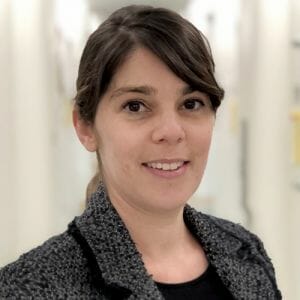 The NAVBO Meritorious Awards Committee, the Scientific Advisory Board, and the NAVBO Council announce with pleasure the selection of Kristy Red-Horse, PhD, as the recipient of the 2020 Judah Folkman Award in Vascular Biology. This award recognizes outstanding contributions from vascular biologists who are at mid-career (within fifteen years of their first faculty appointment). Dr. Red-Horse will present her Folkman Award Lecture, titled “Artery Development and Regeneration,” as an online webinar on November 2 at 1:00pm ET. The webinar will be accessible to all NAVBO members.
The NAVBO Meritorious Awards Committee, the Scientific Advisory Board, and the NAVBO Council announce with pleasure the selection of Kristy Red-Horse, PhD, as the recipient of the 2020 Judah Folkman Award in Vascular Biology. This award recognizes outstanding contributions from vascular biologists who are at mid-career (within fifteen years of their first faculty appointment). Dr. Red-Horse will present her Folkman Award Lecture, titled “Artery Development and Regeneration,” as an online webinar on November 2 at 1:00pm ET. The webinar will be accessible to all NAVBO members.
Dr. Red-Horse received a BA in Microbiology from the University of Arkansas (1999), an MS in Biology from San Francisco State University (2001), and PhD from UC-San Francisco (2005). Following post-doctoral stints in Tumor Biology and Angiogenesis at Genentech and Biochemistry at Stanford University, she joined the faculty of Stanford’s Department of Biology in 2012, rising to the rank of Associate Professor in 2019. Dr. Red-Horse has earned a number of awards and fellowships, including a K99/R00 Pathway to Independence Award from the NIH/NHLBI, Terman and Chambers Fellowships, and has been designated a Searle Scholar, a New York Stem Cell Foundation Robertson Investigator, and a Brown Faculty Fellow.
Dr. Red-Horse’s prior and ongoing research is focused in four major areas: molecular mechanisms and cellular lineages in coronary artery development and regeneration; single cell transcriptomics of the coronary vasculature; support of myocardial growth by the coronary endothelium; and transcriptional and mechanical regulation of coronary artery patterning. Her laboratory’s efforts have led to recognition that multiple coronary vessel progenitor sources can compensate for developmental defects and potentially be recruited to effect cardiac repair. Dr. Red-Horse’s pioneering work in single-cell transcriptional analysis has led to key and surprising discoveries on the location, molecular mechanisms, and blood flow-dependence of vessel specification and vein-to-artery conversion. She and members of her lab have published a steady stream of well-received papers in top journals, including Nature, Cell, Development, and the Journal of Clinical Investigation.
Writing in support of Dr. Red-Horse’s nomination for the Folkman Award, her professional colleagues note that “…Kristy is already being included in a select group of elite cardiovascular developmental biologists, even with many years less experience as an independent investigator” and that “[h]er career is still in an upward trajectory in the sense that she has a lot more to offer scientifically and otherwise; yet she has already accomplished a tremendous amount.” Moreover, we at NAVBO are presently benefitting from Kristy’s service as a member of the NAVBO Council.
Please join us online with host, Sophie Astrof, to honor Dr. Red-Horse as she receives the Folkman Award in recognition of her accomplishments…and bright future…as a vascular biologist.
Compiled by William R. Huckle,
NAVBO Editor
2019 NAVBO JUDAH FOLKMAN AWARD IN VASCULAR BIOLOGY - ANNE EICHMANN, PH.D., YALE SCHOOL OF MEDICINE
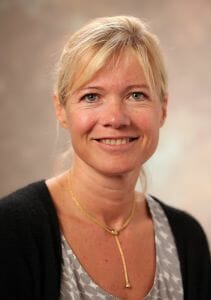 The NAVBO Meritorious Awards Committee, the Scientific Advisory Board, and the NAVBO Council announce with pleasure the selection of Anne Eichmann, Ph.D., as the recipient of the 2019 Judah Folkman Award in Vascular Biology. This award recognizes outstanding contributions from vascular biologists who are at mid-career (within fifteen years of their first faculty appointment). Dr. Eichmann will present her Folkman Award Lecture, titled “Guidance of Vascular Barrier Formation” and receive the award at Vascular Biology 2019 in Pacific Grove, California (October 30, 2019).
The NAVBO Meritorious Awards Committee, the Scientific Advisory Board, and the NAVBO Council announce with pleasure the selection of Anne Eichmann, Ph.D., as the recipient of the 2019 Judah Folkman Award in Vascular Biology. This award recognizes outstanding contributions from vascular biologists who are at mid-career (within fifteen years of their first faculty appointment). Dr. Eichmann will present her Folkman Award Lecture, titled “Guidance of Vascular Barrier Formation” and receive the award at Vascular Biology 2019 in Pacific Grove, California (October 30, 2019).
Dr. Eichmann completed undergraduate studies in Veterinary Medicine at the Freie Universität, in Berlin and an MSc at the Weizmann Institute in Israel, earning her PhD in Molecular and Cell Biology at the Universite Paris XI, Orsay (1994). Following stints as Research Fellow in the CNRS Institut d’Embryologie in Nogent-sur-Marne, France and Research Director at the Collège de France, she joined the faculty of Medicine at Yale University in 2010. She is currently the Ensign Professor of Medicine (Cardiology), Professor of Cellular and Molecular Physiology, and a member of the Yale Cardiovascular Research Center.
Dr. Eichmann’s laboratory studies the mechanisms that govern cellular guidance and tissue patterning during vascular and lymphatic development, with a focus on “tip cells,” specialized endothelial cells located on the leading edge of growing capillary sprouts. These slowly-proliferating cells appear to serve as guides to vascular patterning, by extending filopodia that explore the tip environment. The endothelial cells that follow behind, termed “stalk cells,” proliferate more rapidly and actively form a capillary lumen capable of sustaining blood flow. Her research findings have been published in top-tier journals, and her lab has earned significant and sustained funding from the NIH. Her list of honors includes an INSERM young investigator award (2002), the Jean Bernard Award from the Medical Research Foundation FRM (2006), and election as a member of EMBO (2013).
Colleagues writing in support of Dr. Eichmann’s nomination for the Folkman Award noted that her work is “…always of the highest quality possible, is highly innovative, contains extraordinary mechanistic depth and breadth, and continually pushes the frontiers of the vascular biology field.” Others offered that Dr. Eichmann “…is a superb colleague and mentor. She has trained a number of young scientists who have gone on to make significant contributions as independent scientists, such as Ferdinand LeNoble, Liz Jones and Bruno L’Arrivee. She is a generous colleague always ready to provide reagents and ideas to other labs. As service to the vascular biology community, she has done more than her share of meeting organization, served on NAVBO Council, and is a frequent reviewer of manuscripts and grants.”
Please join us for VB2019 at Asilomar this October to honor Dr. Eichmann as she receives the Folkman Award in recognition of her accomplishments and bright future as a vascular biologist.
Compiled by William R. Huckle,
NAVBO Editor
2018 NAVBO JUDAH FOLKMAN AWARD IN VASCULAR BIOLOGY - CHRISTIANA RUHRBERG, UNIVERSITY COLLEGE OF LONDON
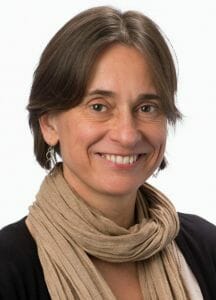 The NAVBO Meritorious Awards Committee, the Scientific Advisory Board, and the NAVBO Council announce with pleasure the selection of Christiana Ruhrberg, Ph.D., as the recipient of the 2018 Judah Folkman Award in Vascular Biology. This award recognizes outstanding contributions from vascular biologists who are at mid-career (within fifteen years of their first faculty appointment). Dr. Ruhrberg will present the Folkman Award Lecture and receive the award at Vascular Biology 2018 in Newport, Rhode Island (October 17, 2018).
The NAVBO Meritorious Awards Committee, the Scientific Advisory Board, and the NAVBO Council announce with pleasure the selection of Christiana Ruhrberg, Ph.D., as the recipient of the 2018 Judah Folkman Award in Vascular Biology. This award recognizes outstanding contributions from vascular biologists who are at mid-career (within fifteen years of their first faculty appointment). Dr. Ruhrberg will present the Folkman Award Lecture and receive the award at Vascular Biology 2018 in Newport, Rhode Island (October 17, 2018).
Dr. Ruhrberg completed BSc/MSc studies in Cell Biology at Justus Liebig University in Germany and received her Ph.D. in Biochemistry from Imperial College London in 1997 under the direction of Fiona Watt at the Imperial Cancer Research Fund. She was named Young Cell Biologist of the Year 1996 by the British Society for Cell Biology for her work on proteins that promote epidermal barrier function. She pursued post-doctoral studies in the laboratories of Robb Krumlauf at the National Institute of Medical Research studying cranial motor neuron development, and then with David Shima at the ICRF to elucidate molecular mechanisms of blood vessel growth, with support from the Medical Research Council and Imperial Cancer Research Fund. She joined the staff of the Institute of Ophthalmology at University College London as Principal Research Fellow in 2003, rising to the faculty ranks of Lecturer (2007), Reader (2008), and Professor (2011) of Neuronal and Vascular Development at UCL, where she is a Wellcome Trust Investigator.
Dr. Ruhrberg's research team at UCL seeks to determine how cells of the nervous and vascular systems interact in “co-patterning” during mammalian development and in disease, with the goal of identifying molecular targets for therapeutic intervention in vascular disease. Their experimental approaches combine reverse genetics with tissue culture models to examine how the vascular endothelial growth factor A and class 3 semaphorin proteins convey signals between cells in the brain, retina, heart and lung. Her research, performed in collaboration with some notable investigators from NAVBO and the international vascular communities, has demonstrated that VEGF forms gradients that guide blood vessel growth in developing organs and that Neuropilin 1 has a dual role in VEGF and matrix signalling in the vascularization of the retina. She was the first to demonstrate that VEGF isoforms cooperate during vessel sprouting in the first stage of angiogenesis, and that macrophages act as bridge cells for vessel fusion in the subsequent stage of vessel networking. Further, Dr. Ruhrberg pioneered the mouse hindbrain as a powerful new model for angiogenesis research. To date, she and her associates have published more than 80 papers in the scientific literature, many of which are highly cited, and she has trained >15 doctoral students and postdocs since becoming an independent investigator.
Her award lecture is entitled, "Molecular and cellular mechanisms of blood vessel growth," and will be presented on Wednesday, October 17 at 2:30pm. Please join us for VB2018 in Newport this October to honor Dr. Ruhrberg as she receives this award in recognition of her accomplishments and bright future as a vascular biologist.
Compiled by William R. Huckle,
NAVBO Editor
2017 NAVBO JUDAH FOLKMAN AWARD IN VASCULAR BIOLOGY - GUILLERMO GARCÍA-CARDEÑA, BRIGHAM & WOMEN'S HOSPITAL, HARVARD MEDICAL SCHOOL
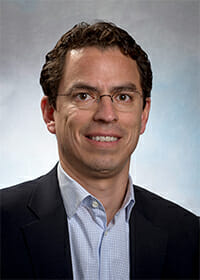 The NAVBO Meritorious Awards Committee, the Scientific Advisory Board, and the NAVBO Council announce with pleasure the selection of Guillermo García-Cardeña, Ph.D., as the recipient of the 2017 Judah Folkman Award in Vascular Biology. This award recognizes outstanding contributions from vascular biologists who are at mid-career (within fifteen years of their first faculty appointment). Dr. García-Cardeña will present the Folkman Award Lecture and receive the award at Vascular Biology 2017 in Pacific Grove, California (October 15-19, 2017).
The NAVBO Meritorious Awards Committee, the Scientific Advisory Board, and the NAVBO Council announce with pleasure the selection of Guillermo García-Cardeña, Ph.D., as the recipient of the 2017 Judah Folkman Award in Vascular Biology. This award recognizes outstanding contributions from vascular biologists who are at mid-career (within fifteen years of their first faculty appointment). Dr. García-Cardeña will present the Folkman Award Lecture and receive the award at Vascular Biology 2017 in Pacific Grove, California (October 15-19, 2017).
Dr. García-Cardeña received his Ph.D. in Molecular Medicine and Pharmacological Sciences at Yale University in 1997, under the tutelage of Dr. William Sessa. Following post-doctoral studies in the laboratory of Dr. Michael Gimbrone at Harvard Medical School, he joined the faculty of Harvard’s Department of Pathology, rising to the rank of Associate Professor in 2010. He currently holds additional appointments as Scientist in the Center for Excellence in Vascular Biology at Brigham and Women’s Hospital, Director of the Laboratory for Systems Mechanobiology in the Center for Excellence in Vascular Biology, Affiliated Faculty Member in the Harvard Stem Cell Institute, and Associate Member of the Broad Institute of Harvard and MIT.
During his doctoral work, Dr. García-Cardeña characterized multiple mechanisms, including covalent modification and subcellular distribution of key proteins, crucial for the regulation of endothelial nitric oxide synthase. These studies identified several novel targets for the regulation of NO production in the vascular system. As a postdoctoral trainee, he undertook investigation of endothelial cell responsiveness to various forms of biomechanical perturbation and their functional consequences for endothelial phenotype. These studies involved the development of high-throughput transcriptional profiling platforms to analyze global gene expression patterns in endothelial cells, as well as the creation of novel devices to simulate in vitro the endothelium under shearing blood flow.
As an independent investigator, Dr. García-Cardeña’s laboratory has continued to investigate mechano-activated signaling in the endothelium, focusing on transcriptional elements Kruppel-like factors 2 and 4 as integrators of the response to flow and as potential targets for novel cardioprotective therapeutics. Other research in his lab examines the role of blood flow initiation as a developmental trigger, demonstrating that hemodynamic forces present in the arterial tree are capable of changing venous endothelial specification to an arterial endothelial fate. His research group has begun to use induced-pluripotent stem cells (iPSC) as a tool to better understand endothelial cell plasticity and for modeling human disease. Dr. García-Cardeña has earned strong support from the NIH for his research and has published more than 60 peer-reviewed papers, many in top-tier journals.
Dr. García-Cardeña’s award nominations describe his scientific studies as “impactful and unique” and “paramount in the field as they have been able to integrate environmental forces with differentiation…” and “…have started a subfield in vascular biology.” “Over his short career, Dr. Garcia-Cardeña has been able to effectively bridge multiple fields and provide clear integration between physical forces, transcriptional regulation and cell biology.”
Dr. García-Cardeña’s award lecture is entitled, "Insights into the Mechanobiology of the Endothelium" and will be presented on Wednesday, October 18 at 2:30pm. Please join us for VB2017 at the Asilomar Conference Grounds this October to honor Dr. García-Cardeña as he receives this award in recognition of his accomplishments and bright future as a vascular biologist.
Compiled by William R. Huckle,
NAVBO Editor
2016 NAVBO JUDAH FOLKMAN AWARD IN VASCULAR BIOLOGY - GABRIELE BERGERS, VIB-KU LEUVEN CENTER FOR CANCER BIOLOGY
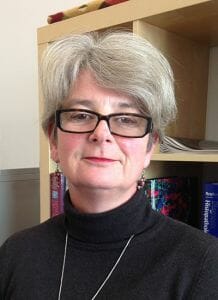 The NAVBO Meritorious Awards Committee, the Scientific Advisory Board, and the NAVBO Council announce with pleasure the selection of Gabriele Bergers, Ph.D., as the recipient of the 2016 Judah Folkman Award in Vascular Biology. This award recognizes outstanding contributions from vascular biologists who are at mid-career (within fifteen years of their first faculty appointment). Dr. Bergers will present the Folkman Award Lecture and receive the award at the 19th International Vascular Biology Meeting (October 30-November 3, 2016) in Boston, Massachusetts.
The NAVBO Meritorious Awards Committee, the Scientific Advisory Board, and the NAVBO Council announce with pleasure the selection of Gabriele Bergers, Ph.D., as the recipient of the 2016 Judah Folkman Award in Vascular Biology. This award recognizes outstanding contributions from vascular biologists who are at mid-career (within fifteen years of their first faculty appointment). Dr. Bergers will present the Folkman Award Lecture and receive the award at the 19th International Vascular Biology Meeting (October 30-November 3, 2016) in Boston, Massachusetts.
Dr. Bergers received a B.S. in Biochemistry at the University of Munich (1988) and M.S. in Biochemistry/Virology at the Max Planck Institute in Martinsried (1989). She completed her Ph.D. in Genetics at the Institute of Molecular Pathology at the University of Vienna (1993), characterizing transcriptional variants in Fos-responsive gene. She relocated to the U.S. in 1994 to pursue postdoctoral studies in the laboratory of Dr. Douglas Hanahan at the University of California, San Francisco, where she became interested in tumor angiogenesis and participated in a collaborative project with the lab of the Folkman Award’s namesake. She has remained at UCSF and became an Assistant Professor in the Brain Tumor Research Center and Departments of Neurosurgery in 2001. Dr. Bergers was a Professor in the Departments of Neurosurgery and Anatomy, a Principal Investigator of the Brain Tumor Center, and holds the Neill. H. and Linda S. Brownstein Chair in Brain Tumor Research at UCSF through 2016. She is now at the VIB-KU Leuven Center for Cancer Biology in Belgium, where she is a Professor in the Departments of Oncology and Neurosurgery.
Dr. Berger’s research concerns the relationship between tumor microenvironment and the angiogenic response, reflecting the complex biochemical and cellular conversations occurring between host and neoplasm. Her lab has made important contributions to our understanding of how VEGF regulates angiogenesis in the special context of solid tumors. In particular, her finding that MMP-9 is capable of releasing VEGF from extracellular matrix in the tumor’s vascular niche has provided a fundamental paradigm in which to understand the “angiogenic switch” as a hallmark of malignant transformation. She has also made important contributions to our understanding of cancer stage-dependent variability in efficacy of anti-angiogenic cancer therapies, as well as the role played by cells of the immune system in promoting tumor neovascularization. In the view of her peers, her work has consistently bridged the realms of detailed molecular biological analysis and in vivo experimentation.
Please join us at IVBM in Boston this fall to honor Dr. Bergers as she receives this well-deserved award. Dr. Bergers will present the Judah Folkman Lecture entitled, "Reciprocal regulation of the vascular and immune state in distinct tumor niches," on November 3 at the International Vascular Biology Meeting in Boston, MA.
Compiled by William R. Huckle,
NAVBO Editor
2015 NAVBO JUDAH FOLKMAN AWARD IN VASCULAR BIOLOGY - MUKESH JAIN, CASE WESTERN RESERVE UNIVERSITY
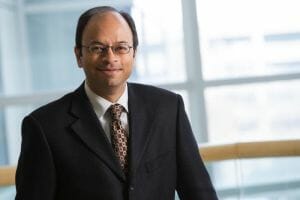 Dr. Jain will present the Judah Folkman Lecture entitled, "KLFs and vessel wall," on October 21 at Vascular Biology 2015 in Hyannis, MA (Cape Cod).
Dr. Jain will present the Judah Folkman Lecture entitled, "KLFs and vessel wall," on October 21 at Vascular Biology 2015 in Hyannis, MA (Cape Cod).
The NAVBO Meritorious Awards Committee, the Scientific Advisory Board and the NAVBO Council announce with pleasure the selection of Mukesh Jain, M.D., as the recipient of the 2015 Judah Folkman Award in Vascular Biology. This award recognizes outstanding contributions from vascular biologists who are at a mid-career level (within fifteen years of their first faculty appointment). Dr. Jain will present the Folkman Award Lecture and receive the award at the NAVBO Workshops in Vascular Biology 2015 (October 18-22) in Hyannis, Massachusetts.
Dr. Jain earned both his B.S. and M.D. degrees from the University of Buffalo. Following an internal medicine residency at Beth Israel Hospital in Boston and Research Fellowships with Dr. Ed Haber at the Harvard School of Public Health and Dr. Mu-En Lee at Brigham and Women's Hospital, Dr. Jain joined the faculty of Harvard Medical School in 2000. In 2006, he became the Ellery Sedgwick Jr. Chair and Distinguished Scientist at Case Western Reserve University & University Hospitals of Cleveland. He is the Founding Director of the Case Cardiovascular Research Institute and Professor of Medicine at Case Western Reserve.
The Folkman Award recognizes Dr. Jain's contributions to characterizing the Kruppel-like factors (KLFs), transcriptional regulators now recognized to be involved in an extraordinary range of biological processes, stretching from systemic nutrient homeostasis to insulin resistance to myeloid cell differentiation to atherogenesis. As noted by his fellow vascular biologists, Dr. Jain's work has had"...significant implications for our understanding of the mechanisms underlying the initiation and progression of vascular inflammation and cardiovascular myopathies."
In addition to his scientific accomplishments, Dr. Jain has trained and mentored numerous young physician-scientists, a contribution that earned him mentorship awards at both Harvard and Case Western Reserve. Under his tutelage, trainees have been remarkably successful in establishing independent research programs. All writing in support of his nomination for the Folkman Award mention his generosity of spirit as a colleague and mentor, for example noting that "...few very competitive biomedical researchers epitomize the "Folkman" tradition as well as Mukesh. He is not only an outstanding physician-scientist with a consummate love of science and drive to answer important questions in vascular biology, but he is a true gentleman and a fantastic collaborator." Among many examples of Dr. Jain's involvement in his profession, he is past member of the NAVBO Council and President of the American Society for Clinical Investigation. Please join us in Hyannis in October to celebrate Dr. Jain's achievements in vascular biology as the Folkman Award winner.
Compiled by William R. Huckle,
NAVBO Editor
2014 NAVBO JUDAH FOLKMAN AWARD IN VASCULAR BIOLOGY - TATIANA V. BYZOVA, CLEVELAND CLINIC
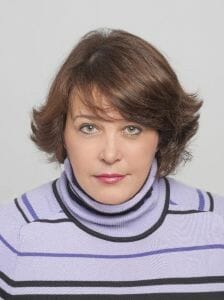 Dr. Byzova will give her talk, "Mechanisms of cellular integration in vasculature," on October 22 at Vascular Biology 2014 in Pacific Grove, CA (on the Monterey Peninsula).
Dr. Byzova will give her talk, "Mechanisms of cellular integration in vasculature," on October 22 at Vascular Biology 2014 in Pacific Grove, CA (on the Monterey Peninsula).
The NAVBO Meritorious Awards Committee and Council announce with pleasure the selection of Tatiana Byzova, Ph.D., as the recipient of the 2014 Judah Folkman Award in Vascular Biology. This award recognizes outstanding contributions from vascular biologists who are at a mid-career level (within fifteen years of their first faculty appointment). Dr. Byzova is Vice-Chair, Department of Molecular Cardiology, and the Robert Canova Endowed Chair in Angiogenesis Research in the Lerner Research Institute at the Cleveland Clinic. She will present the Judah Folkman Award Lecture during Vascular Biology 2014 in Pacific Grove, California, on October 22, 2014.
Dr. Byzova received her Ph.D. in Cell Biology in 1995 at the Institute of Experimental Cardiology, National Cardiology Research Center, Moscow, Russia. In 1996, she began post-doctoral studies in the laboratory of Dr. Edward F. Plow in Molecular Cardiology, Center for Thrombosis and Vascular Biology at Lerner. There she has remained to the present, rising in 2008 to the position of Staff (Full Professor equivalent) in the Departments of Molecular Cardiology and Cardiovascular Medicine and the Taussig Cancer Center.
Tatiana Byzova has made major contributions to our understanding of vascular biology and mechanisms of angiogenesis. Particularly noteworthy are her studies showing that: crosstalk between VEGF/VEGFR and integrins depends on their formation of a physical complex, that phosphorylation regulates this interaction, and that this complex determines their collective ability to regulate angiogenesis in vivo. In addition, the work of her lab has indicated that different isoforms of Akt activate cell-specific signaling pathways in distinct cell types, including those leading to an angiogenic response of endothelial cells.
In other studies, her lab has showed that the molecular pattern of end products of lipid oxidation, generated during inflammation, is recognized by TLR2 on endothelial cells. This interaction leads to VEGF-independent angiogenesis, a previously unrecognized pathway of angiogenesis. Thus, she established that, along with pathogen- and danger- associated molecular patterns, TLRs sense and respond to oxidation-associated molecular patterns, and TLRs can trigger the responses of endothelial cells to support angiogenesis in vivo. These paradigm-shifting studies have been broadly publicized and are likely to define new directions in angiogenesis research for many years to come. Her research, in the words of one of her nominators, "...epitomizes the spirit of Dr. Folkman."
In addition to attending to her own research interests, Dr. Byzova has generously served her fellow vascular biologists as a Councilor to NAVBO, helped to organize Vasculata in Cleveland, and is the NAVBO liaison to the ATVB Council of the AHA. Please join us at Asilomar for Vascular Biology 2014 to recognize Dr. Byzova's contributions to our field.
Compiled by William R. Huckle,
NAVBO Editor
2013 NAVBO JUDAH FOLKMAN AWARD IN VASCULAR BIOLOGY - MARK KAHN, UNIVERSITY OF PENNSYLVANIA
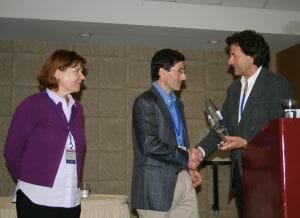 Dr. Klaus, NAVBO President, presents the Judah Folkman Award in Vascular Biology to Dr. Mark Kahn, University of Pennsylvania. Dr. Heidi Stuhlman, Weill Medical College, introduced Dr. Kahn.
Dr. Klaus, NAVBO President, presents the Judah Folkman Award in Vascular Biology to Dr. Mark Kahn, University of Pennsylvania. Dr. Heidi Stuhlman, Weill Medical College, introduced Dr. Kahn.
The NAVBO Meritorious Awards Committee, the Scientific Advisory Board and the NAVBO Council announce with pleasure the selection of Mark Kahn, M.D., as the recipient of the 2013 Judah Folkman Award in Vascular Biology. This award recognizes outstanding contributions from vascular biologists who are at a mid-career level (within fifteen years of their first faculty appointment). Dr. Kahn will present the Folkman Award
Lecture, "Signaling pathways in vascular development and disease," and receive the award at the Award Lectures and Ceremony on Wednesday, October 23 at Vascular Biology 2013 (October 20-24) in Hyannis, Massachusetts.
Dr. Kahn earned both his B.A. and M.D. degrees from Brown University. Following an internal medicine residency at the Oregon Health and Science University in Portland, he pursued a series of fellowships, in Medicine at the NHLBI, in clinical cardiology at the University of California, San Francisco, and in cardiology research at UCSF. He joined the Medicine faculty at the University of Pennsylvania in 1999, rising to the rank of Professor of Medicine in 2009. He serves also on the cardiology medical staffs of the Hospital of the University of Pennsylvania and the associated VA Medical Center. In addition, he is Director of the CVI Mouse Cardiovascular Physiology Core at UPenn.
The Folkman Award recognizes Dr. Kahn's contributions to our understanding of intercellular signaling mechanisms in the growth of the blood and lymphatic vessels, including novel roles of platelets in vascular development and homeostasis. He previously has received a variety of honors and research awards, including a Howard Hughes Post-doctoral Fellowship, a Buegher Award for Basic Investigation of Stroke from the American Heart Association, an AHA Young Investigator Award in Thrombosis, and an Established Investigator Award from the AHA. His laboratory has achieved an excellent level of funding, garnering support from the NIH, the Leducq Foundation, and the AHA. He has published widely, with authorship on upwards of 60 papers in peer-reviewed journals, and is in steady demand as an invited speaker. Dr. Kahn also is an active and contributing NAVBO member, serving this year as one of the organizers of the Workshop on Biology of Signaling in the Cardiovascular System, one of the components of Vascular Biology 2013. Please join us in Hyannis in October both to enjoy the fruits of Dr. Kahn's efforts in putting Vascular Biology 2013 together and to celebrate his achievements in vascular biology as the Folkman Award winner.
by William R. Huckle,
NAVBO Editor
2012 NAVBO JUDAH FOLKMAN AWARD IN VASCULAR BIOLOGY - CAM PATTERSON, UNIVERSITY OF NORTH CAROLINA, CHAPEL HILL
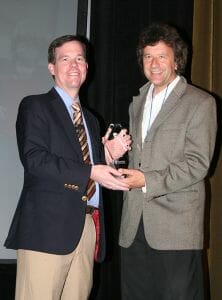 Dr. Patterson accepts the 2012 Judah Folkman Award in Vascular Biology from Dr. Klaus Ley (Meritorious Awards Committee Chair and President-Elect) at the NAVBO Workshops in Vascular Biology 2012 in Monterey, CA
Dr. Patterson accepts the 2012 Judah Folkman Award in Vascular Biology from Dr. Klaus Ley (Meritorious Awards Committee Chair and President-Elect) at the NAVBO Workshops in Vascular Biology 2012 in Monterey, CA
At the recent NAVBO meeting in Asilomar, Cam Patterson received the Judah Folkman Award in Vascular Biology. Cam gave a very inspiring talk on the power of translational research and how his own research efforts have led to an incipient product that is now in clinical trials. What is most amazing is that the discovery came in an unexpected area: cancer, not vascular biology.
Cam received his M.D. from Emory, where he also completed his residency in cardiology. After a postdoc with Ed Haber at Harvard, he moved to the University of Texas at Galveston and, in 2000, to the University of North Carolina at Chapel Hill, where he headed the McAllister Heart Institute for 10 years. In 2005, he became Associate Dean for Health Care Entrepreneurship and Chief of the Division of Cardiology.
When I asked Cam what his proudest achievement was, he did not hesitate a moment: "The 45 training grants I helped my trainees obtain." Over the years, Cam's research covered many areas including the role of ubiquitin ligases in vascular biology.
But the most impactful discovery was the development of an antibody that is currently in phase 1 clinical trials for tumor angiogenesis. The discovery strategy was based on laser capture microdissection of human breast cancer specimens followed by transcriptomic analysis. Then, Cam and his team screened the transcripts for cell surface and secreted proteins and came up with 8 candidates. The most promising target turned out to be SFRP2, a secreted ligand for the Frizzled-5 receptor. The antibody to SFRP2 appears to work in tumors that have become resistant to standard anti-VEGF therapy. Preclinical toxicology tests were successfully conducted in SCID mice bearing human breast cancers, and Cam found that his SFRP2 antibody accumulates in the tumor. Recently, he raised $ 5 million from philanthropists and private donors for a phase I clinical trial.
This amazing story closes the loop from bedside to bench to bedside and emphasizes that discovery is always unexpected. How fitting that Cam received the Folkman award, named after the founding pioneer of angiogenesis research applied to tumor biology. Congratulations!
by Klaus Ley
 2025 Recipient of the Earl P. Benditt Award
2025 Recipient of the Earl P. Benditt Award
The NAVBO Meritorious Awards Committee and NAVBO Council are pleased to announce the selection of Anne Eichmann, PhD, as the 2025 recipient of the Earl P. Benditt Award, in recognition of her numerous contributions to our understanding of tissue patterning during vascular and lymphatic development. Dr. Eichmann will present the Benditt Lecture, titled, “Guidance of vascular patterning” and receive the award, one of NAVBO's highest honors, at Vascular Biology 2025 in Hyannis, Massachusetts in October.
Dr. Eichmann completed undergraduate studies in Veterinary Medicine at the Freie Universität, in Berlin and an MSc at the Weizmann Institute in Israel, earning her PhD in Molecular and Cell Biology at the Universite Paris XI, Orsay (1994). Following stints as Research Fellow in the CNRS Institut d’Embryologie in Nogent-sur-Marne, France and Research Director at the Collège de France, she joined the faculty of Medicine at Yale University in 2010. She is currently the Ensign Professor of Medicine (Cardiology), Professor of Cellular And Molecular Physiology, and a member of the Yale Cardiovascular Research Center.
Dr. Eichmann’s current research focuses on the role of tip cells, located at the extremities of growing capillary sprouts, as mediators of vascular patterning. Her lab’s work has help to establish VEGF and the endothelial-specific Notch ligand Delta-like 4 (Dll4) in positive and negative regulation of tip cell function. Studies with mouse models has allowed her group to identify novel tip-cell enriched genes. Her investigations also highlight morphological parallels between capillary sprouting and axon guidance in development. Like endothelial tip cells, axonal growth cones extend filopodia that sense and respond to extracellular guidance cues. Other areas of interest include selective expression of VEGF co-receptor Neuropilin variants in arteries compared to veins or lymphatics. Her research findings have been published in top-tier journals, and her lab has earned significant and sustained funding from the NIH. Her list of honors includes an INSERM young investigator award (2002), the Jean Bernard Award from the Medical Research Foundation FRM (2006), election as a member of EMBO (2013), and NAVBO’s Judah Folkman Award in 2019.
Professional colleagues writing in support of Dr. Eichmann’s nomination for the Benditt Award note that her “…discoveries have been pivotal in shaping current scientific thought on vascular biology…,” indicative of the broad impact on development of new therapeutic approaches as well as on biologic fundamentals. Those acquainted with Dr. Eichmann’s history as a mentor celebrate her willingness to foster “…creativity and independent thinking in her trainees, many of whom have gone on to become successful scientists in their own right.”
Please join us at VB2025 in Hyannis this October to honor Dr. Eichmann as she receives this well-deserved award.
APRIL 15, 1916–MAY 27, 1996
EARL P. BENDITT AWARD PRESENTED BY NAVBO
This award recognizes an individual who has made an outstanding discovery or developed a concept that has been seminal to our understanding of vascular biology or pathology.
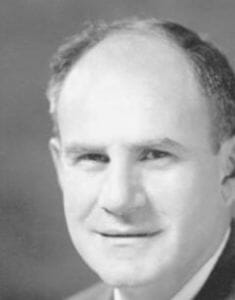
The recipient will receive a crystal plaque and a monetary award and will be asked to give a lecture at the Vascular Biology Meeting.
Recipients of the Earl P. Benditt Award include:
 2024 Recipient of the Earl P. Benditt Award
2024 Recipient of the Earl P. Benditt Award
The NAVBO Meritorious Awards Committee and NAVBO Council are pleased to announce the selection of Asrar B. Malik, Ph.D., as the 2024 recipient of the Earl P. Benditt Award, in recognition of his numerous contributions to our understanding of pulmonary vascular barrier function and dysfunction and receptor-mediated activation of signaling pathways in the endothelium. Dr. Malik is currently the Schweppe Family Distinguished Professor of Pharmacology & Regenerative Medicine at the University of Illinois College of Medicine in Chicago. Dr. Malik will present the Benditt Lecture, titled “The Ins and Outs of the Endothelial Barrier” and receive the award, one of NAVBO's highest honors, at Vascular Biology 2024 in Pacific Grove, California in October.
Following undergraduate studies in the Departments of Anatomy & Cell Biology and Physiology at Western University in London, Ontario, Dr. Malik earned his PhD in Physiology at the University of Toronto in 1971. He pursued post-doctoral research in Physiology at the Washington University-St Louis School of Medicine and joined the Physiology faculty at Albany Medical College in 1974, rising to full Professor in 1980. He relocated to Chicago in 1993 as Professor and Chairman of the Department of Pharmacology at Rush Medical College, then to his current institution as Professor and Head of Pharmacology & Regenerative Medicine in 1996. While at UI-Chicago he has held leadership posts in the Center for Lung and Vascular Biology and the Center for the Development of Stem Cell Therapies for Human Disease. Dr. Malik was honored as Distinguished Professor in 2001 and assumed the Schweppe Family Professorship in 2011.
Over the decades, work in Dr. Malik’s laboratory has helped delineate the molecular mechanisms that govern vascular permeability in a variety of normal homeostatic contexts (such as hemostasis and adaptive angiogenesis) and pathologies (sepsis, thrombosis, tumor angiogenesis). His 1990 Journal of Clinical Investigation paper titled “Increased endothelial albumin permeability mediated by protein kinase C activation” described the involvement of protein kinases as key signaling elements regulating the behavior of adherens junctions. This work proved pivotal as it opened investigation into the pharmacologic manipulation of pathways that can disrupt vascular integrity, resulting in plasma protein leakage and dysregulated inflammatory cell escape – hallmarks of inflammation – and led to the development of novel anti-inflammatory strategies. Subsequent contributions have included identifying the roles of small GTPases and the heterotrimeric G protein family in formation of the endothelial barrier and controlling endothelial polarity and proliferation. Seminal work on neutrophil migration identified novel regulatory pathways amenable to targeted therapies and tissue repair in inflammatory diseases. More recent work investigating transient receptor potential (trp) cationic channels in endothelial cells using nanoparticles has invigorated the search for anti-inflammatory nanomedicines. His laboratory has been strongly and consistently supported by the NIH over many years. He and his collaborators have published well over 400 peer-reviewed papers, 60+ reviews, and 30+ books or book chapters.
Letters in support of Dr. Malik’s nomination for the Benditt Award note, in addition to his specific contributions to our understanding of vascular permeability, that Dr. Malik has served important leadership roles as Program Director of an NIH T32 Training Program in Lung Biology and Pathobiology for 28 years, as Editor-in-Chief of the American Journal of Physiology- Lung (2000-2005), and as a member of study sections for the NIH and Veterans Administration. Further, he has fostered international scientific cooperation, organizing the first NIH- sponsored meetings in Mumbai, India and creating exchange programs for international scholars from Europe, China, India and Japan. Another letter of support noted that “Dr. Malik has trained an entire generation of new vascular biologists with expertise across the spectrum of vascular biology and vascular disease over a period that, remarkably, spans 40+ years. Dr. Malik’s trainees presently run labs across the world. The creation of the next generation of scientists is arguably the most important contribution a senior scientist can make, and Dr. Malik’s progeny speak to a long-lasting legacy for both himself and the field of vascular biology that is in the true spirit of the Benditt award.”
Please join us at VB2024 at Asilomar this October to honor Dr. Malik as he receives this well-deserved award.
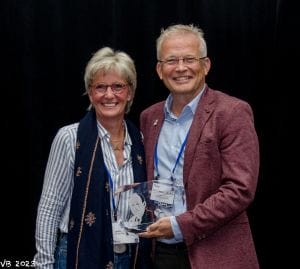
Dr. Vikkula with his wife and colleague, Dr. Laurence Boon, after receiving the 2023 Benditt Award
2023 Recipient of the Earl P. Benditt Award
The NAVBO Meritorious Awards Committee and NAVBO Council are pleased to announce the selection of Miikka Vikkula, MD, PhD, as the 2023 recipient of the Earl P. Benditt Award, in recognition of his numerous contributions to our understanding of the genetic basis of lymphatic and vascular anomalies. Dr. Vikkula is currently Full Professor of Human Genetics at the Catholic University of Louvain, Belgium. Dr. Vikkula will present the Benditt Lecture, titled “From pathophysiology of vascular malformations towards therapeutic trials,” and receive the award, one of NAVBO's highest honors, at Vascular Biology 2023 in Newport, Rhode Island (October 15, 2023).
A native of Finland, Dr. Vikkula earned a medical degree at the University of Helsinki in 1993 and a PhD in Molecular Genetics under Leena Peltonen at the same institution the following year. Having previously been a visiting summer MD/PhD scholar with Darwin Prockop at Thomas Jefferson University, he returned to the US as a Research Associate with Bjorn Olsen at Harvard (1993-1997), funded in part by an NIH Fogarty Fellowship. He joined the de Duve Institute in Brussels as a Guest Investigator in 1997 and the faculty of the Catholic University of Louvain in 2000. Since then, he has risen through the ranks at both institutions and now holds the distinguished titles of Full Professor at the Catholic University, Member of the Directorate of the de Duve Institute, and Honorary Master of Research as designated by Belgium’s National Fund for Scientific Research (FNRS).
Dr. Vikkula’s research has focused on discovery of the genetic characteristics that drive development of a variety of vascular anomalies, notably Lymphedema and certain cancers. The work in his laboratory has combined study of primary patient specimens with the crafting of cell-based and animal models in which to probe mechanisms and pilot new approaches to treatment or prevention of vascular anomalies. This work has been facilitated by the application of cutting-edge exome sequencing and an advanced home-grown bioinformatics platform that integrates multiple in-silico analysis programs. Significant among discoveries in Dr. Vikkula’s lab was the ground-breaking recognition in 2009 that more than 50% of sporadic human vascular malformations are associated with somatic mutations in the angiopoietin receptor TIE2. This finding has led to targeting the over-activated endothelial TIE2-PI3K-AKT-mTOR signaling axis as a novel therapeutic strategy.
The impact of Dr. Vikkula’s work has been recognized by a number of keynote lectureships and awards, including the Eugène de Sommer Scientific Award from the Catholic University (2006) and FNRS’s Lambertine-Lacroix Prize (2010). In addition to funding from the FNRS, Dr. Vikkula has developed fruitful research collaborations supported by the NIH (with Joyce Bischoff) and the Leducq Network of Excellence. He has trained a host of doctoral students and published more than 250 peer-reviewed papers, reviews, and book chapters. Letters in support of Dr. Vikkula’s nomination for the Benditt Award note that his fundamental discoveries have “…allowed a better clinical distinction of lymph/vascular anomalies, making possible a basis for a renewed, extended classification…” system. Moreover, “…Prof Vikkula has laid the foundation for development of new therapeutics which are being tested in clinical trials. His contributions have therefore been of uttermost importance, not only for basic understanding of the healthy blood and lymphatic vasculature, but also for a range of conditions with genetic or acquired diseases for which treatments have been lacking. Thus, like Prof Earl P. Benditt, Prof Vikkula has truly broken scientific barriers with his research and contributions in the field of Vascular and Lymphatic Biology.”
Please join us at VB2023 at the Newport Harbor Island Resort this October to honor Dr. Vikkula as he receives this well-deserved award.
 2022 Recipient of the Earl P. Benditt Award
2022 Recipient of the Earl P. Benditt Award
The NAVBO Meritorious Awards Committee and Council are pleased to announce the selection of Joyce E Bischoff, PhD, as the 2022 recipient of the Earl P. Benditt Award, in recognition of her numerous contributions to our understanding of vascular development, the cell biology of hemangioma, and the plasticity of cardiac valve endothelium. Dr. Bischoff is currently Professor in the Department of Surgery and Member Biological and Biomedical Sciences Graduate Program at Harvard Medical School. She also holds an appointment in the Vascular Biology Program at Boston Children’s Hospital. Dr. Bischoff will present the Benditt Lecture and receive the award, one of NAVBO's highest honors, at the 22nd International Vascular Biology in the San Francisco Bay Area (October 13, 2022).
Dr. Bischoff earned an undergraduate degree in Chemistry at Duke, followed by a PhD in Biochemistry from Washington University, St. Louis, in 1985. She then pursued postdoctoral research with Harvey Lodish in Cell and Molecular Biology at the Whitehead Institute and joined the faculty of the Department of Surgery at Harvard Medical School in 1990. She rose to the rank of Professor of Surgery in 2010.
Dr. Bischoff is recognized internationally as an expert in the roles played by endothelial cells and pericytes in normal vascular homeostasis and a variety of vascular diseases. For decades, her lab has studied hemangioma, a fast-growing vascular tumor that can causing organ damage, disfigurement and other morbidities. Her lab has used cellular and animal models to identify molecular mechanisms and new therapeutics that safely can prevent hemangiomas from growing to an endangering size. More recently, her lab’s work on vascular neoplasia has extended to poorly-understood capillary, lymphatic, and venous malformations distinct from hemangioma but are also and medical therapies are needed.
In pursuit of cell-based therapies for cardiovascular insufficiency, Dr. Bischoff and colleagues have investigated the utility of endothelial progenitor cell populations for endothelializing vascular grafts in large and small animal models. sheep model and for building networks of human blood vessels rapidly in vivo using athymic nude mice. Their studies have revealed that endothelial colony forming cells can assemble into perfused vessels when injected into ischemic rat myocardium, promoting recovery of heart function over time. Heart valve endothelial cells have also been a focus of Dr. Bischoff’s interest, owing to their unique plasticity compared their counterparts lining large vessels or microvessels.
Dr. Bischoff has published more than 115 peer-reviewed papers and dozens of reviews and served as a Co-Editor -in-Chief of the Springer journal Angiogenesis from 2005-2020. She has received numerous honors and invited lectureships and has served NAVBO both as a Councilor (2005-2008) and as President (2015-2016).
Colleagues writing in support of Dr. Bischoff’s nomination noted that the journal Angiogenesis rose in stature and impact factor under her editorial guidance, and younger colleagues highlighted her generous mentorship and willingness to share the benefit of her experiences as an educator and researcher. “She epitomizes the notion of leading by example while passionately embracing scientific rigor with a uniquely kind and humble touch. She never misses the opportunity to give full credit to her mentees and colleagues, demonstrating how much she values them. Indeed, the greatest testament to Dr. Bischoff's role model in science is the research emanating from her many trainees' independent laboratories.”
Please join us at IVBM2022 at the Oakland Marriott City Center this October to honor Dr. Bischoff as she receives this well-deserved award.
2021 NAVBO EARL P. BENDITT AWARD - GUILLERMO OLIVER, PH.D., NORTHWESTERN UNIVERSITY
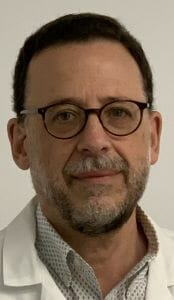 The NAVBO Meritorious Awards Committee and Council are pleased to announce the selection of Guillermo Oliver, MS, PhD, as the 2021 recipient of the Earl P. Benditt Award in recognition of his numerous contributions to our understanding of the cell biology of the lymphatic system. Dr. Oliver is currently the Thomas D Spies Professor of Lymphatic Metabolism, the Director of the Center for Vascular and Developmental Biology and Director of the Regenerative Biology & Stem Cell Initiative at Northwestern University. He will present the Benditt Lecture, titled “Prox1 and lymphatics, a personal perspective,” and receive the award, one of NAVBO's highest honors, online on November 2 at 1:00pmET - click here to register.
The NAVBO Meritorious Awards Committee and Council are pleased to announce the selection of Guillermo Oliver, MS, PhD, as the 2021 recipient of the Earl P. Benditt Award in recognition of his numerous contributions to our understanding of the cell biology of the lymphatic system. Dr. Oliver is currently the Thomas D Spies Professor of Lymphatic Metabolism, the Director of the Center for Vascular and Developmental Biology and Director of the Regenerative Biology & Stem Cell Initiative at Northwestern University. He will present the Benditt Lecture, titled “Prox1 and lymphatics, a personal perspective,” and receive the award, one of NAVBO's highest honors, online on November 2 at 1:00pmET - click here to register.
Dr. Oliver earned an MS (1983) at the Institute of Biomedical Research, National University of Mexico in Cuernavaca, and a PhD (1990) from the School of Sciences, University of Uruguay, Montevideo. His doctoral research, conducted under the mentorship of Edward De Robertis at UCLA, examined the role of homeobox genes in vertebrate pattern formation. Following stints on the faculty of the University of Uruguay and the staff of the Max Planck Institute of Biophysical Chemistry in Gottingen, he joined the faculty at St. Jude Children’s Research Hospital, rising to the rank of Professor in 2006. He moved to the Northwestern Feinberg School of Medicine in 2015, assuming the Spies Professorship and the leadership positions he now holds.
Among the most significant contributions Dr. Oliver has made in his research career is the characterization of the lymphatic system as a fluid-dynamic and developmental marvel, in essence rediscovering a vascular network which had been virtually ignored by researchers during the 20th century. In a seminal work published in Cell in 1999, his lab identified Prox1 as the first specific marker for lymphatic endothelial cells (LECs) and described the first mouse model devoid of a lymphatic vasculature. Subsequently, his group proposed and demonstrated that blood endothelial cells (BECs) are the default condition from which LEC fate is induced by Prox1 (published in EMBO J, 2002) and that the LEC phenotype is plastic and reversible and requires constant expression of Prox1 to maintain its differentiated state (Genes & Dev, 2008). In 2007, his laboratory demonstrated that most embryonic LECs were venous-derived by using a detailed lineage tracing approach (Genes & Dev, 2007).
Across these years, his laboratory dissected the molecular mechanisms leading to the specification and differentiation of LECs during development. In a surprising twist, Dr. Oliver and his colleagues discovered that a defective lymphatic vasculature promotes obesity in mice (Nat Genetics, 2005). Importantly, in the Discussion section of that paper Dr. Oliver argued that, like Prox1+/− mice, individuals with subtle defects in the patterning and integrity of their lymphatic vasculature might not have overt symptoms of lymphatic dysfunction, and lymphatic abnormalities may therefore remain undetected. This visionary concept is currently becoming valid and relevant, as the functional roles of the lymphatic vasculature in pathophysiological conditions, including obesity, has been increasingly recognized in recent years, changing our conventional views about the roles of the lymphatic vasculature in health and disease. Morphological or functional defects in the lymphatic vasculature have now been uncovered in several pathological conditions supporting his original proposal that subtle, asymptomatic alterations in lymphatic vascular function could underlie the variability seen in the body’s response to a wide range of human diseases. More recently, work in progress in his lab identified an unexpected novel functional role of lymphatic-derived lympho-angiocrine factors in cardiac growth and repair.
Dr. Oliver and his collaborators have published over 120 peer-reviewed papers, and his research on Prox1 in mammalian lymphangiogenesis has earned NIH RO1 support for 18 consecutive years. He enjoys the great respect and admiration of his scientific peers for both his research accomplishments and his role as a mentor for young scientists. Notes of his award nominees: “The creation of the next generation of scientists is arguably the most important contribution a senior scientist can make, and in the case of Dr. Oliver he has populated an entire field of vascular biology. This is a lasting legacy for both Dr. Oliver and vascular biology that is in the true spirit of the Benditt award.”
Please join us on November 2 at 1:00pmET to honor Dr. Oliver as he receives this well-deserved award.
Compiled by William R. Huckle,
NAVBO Editor
2020 NAVBO EARL P. BENDITT AWARD - PATRICIA D'AMORE, SCHEPHEN'S EYE INSTITUTE, MASS EYE AND EAR, HARVARD MEDICAL SCHOOL
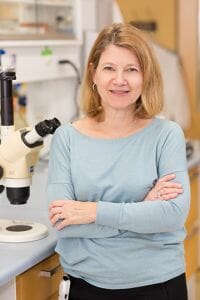 The NAVBO Meritorious Awards Committee and Council are pleased to announce the selection of Patricia D’Amore, PhD, MBA, as the 2020 recipient of the Earl P. Benditt Award, in recognition of her numerous contributions to our understanding of vascular development and growth. Dr. D’Amore is currently the Charles L. Schepens Professor of Ophthalmology and Professor of Pathology at Harvard Medical School. She will present the Benditt Lecture"Understanding capillary growth and pathology using the retina as a model system," via an online webinar on November 5 at 1:00pmET. The webinar will be accessible to all NAVBO members.
The NAVBO Meritorious Awards Committee and Council are pleased to announce the selection of Patricia D’Amore, PhD, MBA, as the 2020 recipient of the Earl P. Benditt Award, in recognition of her numerous contributions to our understanding of vascular development and growth. Dr. D’Amore is currently the Charles L. Schepens Professor of Ophthalmology and Professor of Pathology at Harvard Medical School. She will present the Benditt Lecture"Understanding capillary growth and pathology using the retina as a model system," via an online webinar on November 5 at 1:00pmET. The webinar will be accessible to all NAVBO members.
Dr. D’Amore earned a PhD in Biology from Boston University in 1977 and pursued postdoctoral research in the Departments of Ophthalmology and Physiological Chemistry at Johns Hopkins, where she was appointed Assistant Professor in 1980. She returned to Boston in 1981 to join Judah Folkman in the Program in Vascular Biology at Boston Children’s Hospital, where she remains a Research Associate in the Department of Surgery. Dr. D’Amore rose to the rank of Associate Professor of Pathology (1989) and Professor of Ophthalmology (1998) at Harvard Medical School, assuming the Schepens Professorship as Director of Research at the Schepens Eye Research Institute of Mass. Eye and Ear in 2012. In 2014, she was appointed Professor of Pathology at Harvard Medical School, where she directs the Howe Laboratory and serves as Associate Chief for Ophthalmology Basic and Translational Research in the Department of Ophthalmology.
Dr. D’Amore is recognized internationally as an expert in vascular growth and development, working at the forefront of angiogenesis research for over three decades. Among her foremost contributions is the identification of vascular endothelial growth factor (VEGF) as the elusive causative factor in ocular diseases characterized by over-exuberant blood vessel growth. These investigations proved fundamental in the rationale for development of anti-VEGF therapies, first approved for clinical use in 2004 and currently in use to treat various cancers, diabetic retinopathy, and age-related macular degeneration. Dr. D’Amore also developed the widely-used hyperoxic murine neonate model of retinopathy, enabling numerous basic scientific investigations of vascular development and preclinical studies of vascular-targeting agents. Her current research focuses on understanding the developmental dynamics and maturational stabilization of the microvasculature.
Dr. D’Amore has published more than 160 peer-reviewed papers, dozens of reviews, and is editor or co-editor of four books. She has received numerous honors, including the Alcon Research Institute Award, the Cogan Award and Proctor Medal from ARVO, the Rous-Whipple Award from the American Society of Investigative Pathology, the Endre A. Balazs Award from the International Society for Eye Research, and the António Champalimaud Vision Award, the highest distinction in ophthalmology and visual science. Most recently, she was elected as a Fellow of American Academy of Arts & Sciences, Medical Sciences.
Colleagues writing in support of Dr. D’Amore’s nomination noted that “…D’Amore is an outstanding teacher, mentor and communicator in the world of vascular biology, locally, nationally and internationally. She is a much sought-after collaborator and colleague, who is passionately committed to the academic mission and presents a wonderful role model for young women trainees in the biomedical sciences. She thus embodies the spirit of Dr. Earl Benditt, as he is remembered for both his scientific contributions and his mentorship.”
Please join Michael Gimbrone online November 5 to honor Dr. D’Amore as she receives this well-deserved award.
Compiled by William R. Huckle,
NAVBO Editor
2019 NAVBO EARL P. BENDITT AWARD - WILLIAM C. SESSA, YALE SCHOOL OF MEDICINE
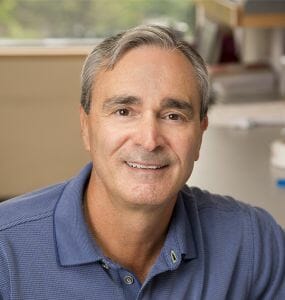 The NAVBO Meritorious Awards Committee and Council is pleased to announce the selection of William Sessa, PhD, as the 2019 recipient of the Earl P. Benditt Award, in recognition of his numerous contributions to our understanding of mechanisms regulating nitric oxide production in the vascular endothelium. Dr. Sessa is currently the Alfred Gilman Professor of Pharmacology and Professor of Medicine at Yale University, where he also serves as Vice Chairman of Pharmacology and Director of the Vascular Biology & Therapeutics Program. He will present the Benditt Lecture and receive the award, one of NAVBO's highest honors, at Vascular Biology 2019 in Pacific Grove, California (October 27, 2019).
The NAVBO Meritorious Awards Committee and Council is pleased to announce the selection of William Sessa, PhD, as the 2019 recipient of the Earl P. Benditt Award, in recognition of his numerous contributions to our understanding of mechanisms regulating nitric oxide production in the vascular endothelium. Dr. Sessa is currently the Alfred Gilman Professor of Pharmacology and Professor of Medicine at Yale University, where he also serves as Vice Chairman of Pharmacology and Director of the Vascular Biology & Therapeutics Program. He will present the Benditt Lecture and receive the award, one of NAVBO's highest honors, at Vascular Biology 2019 in Pacific Grove, California (October 27, 2019).
Following undergraduate studies at the Philadelphia College of Pharmacy and Sciences, Dr. Sessa completed M.S. and Ph.D. studies in Pharmacology at the University of Rhode Island and New York Medical College. He conducted post-doctoral research at the William Harvey Research Institute in London and the University of Virginia, after which he joined the faculty of Yale’s School of Medicine, rising to the rank of Professor of Pharmacology in 1999. His scholarly contributions, reported in well over 300 peer-reviewed publications, book chapters, and reviews, have earned Dr. Sessa numerous awards and honors in the U.S. and internationally, including the 2000 John Jacob Abel Medal in Pharmacology from American Society of Pharmacology and Experimental Therapeutics and the 2010 William Harvey Medal. In 2017, he was awarded an Outstanding Investigator Award (R35) from NHLBI, in strong support of his ongoing investigations of endothelial function.
As noted in his bio, Dr. Sessa’s principal contributions to science revolve around the molecular aspects of endothelial nitric oxide synthase activation and how eNOS regulates angiogenesis, vascular permeability, atherosclerosis and vascular remodeling. As a post-doctoral fellow at UVa, his was one of the three labs to clone eNOS. Across his career as a faculty member, his lab has probed eNOS subcellular trafficking, post-translational lipidation, characterized major sites of eNOS phosphorylation, and showed that growth factors and shear stress regulate eNOS protein-protein interactions and NO release from the endothelium. He was the first to demonstrate that eNOS derived NO regulates angiogenic behaviors of endothelial cells in an autocrine manner in response to VEGF, and it is now appreciated that NO contributes to several of the biological actions of VEGF. Although eNOS was considered a “constitutive gene,” his lab demonstrated that eNOS mRNA and protein levels were induced by exercise training, consistent with a critical adaptive response to changes in shear, pressure and flow.
Dr. Sessa has served his institution and profession in a number of capacities, chairing study sections at the NIH and American Heart Association and serving as President of NAVBO and editor for major cardiovascular journals. As a research mentor, he has trained dozens of post-doctoral fellows and doctoral students, the latter group including NAVBO’s 2017 Judah Folkman Awardee, Guillermo García-Cardeña, PhD and the 2011 Springer Junior Investigator Awardee, Carlos Fernández-Hernando, PhD. Please join us for VB2019 at Asilomar this October to honor Dr. Sessa as he receives this well-deserved award.
Dr. Sessa will give his talk entitled, "Integration of endothelial function and lipid metabolism," on Sunday, October 27, 2019 at 8:15pm in Merrill Hall at the Asilomar Conference Grounds.
Compiled by William R. Huckle,
NAVBO Editor
2018 NAVBO EARL P. BENDITT AWARD - RAKESH JAIN, MASSACHUSETTS GENERAL HOSPITAL, HARVARD MEDICAL SCHOOL
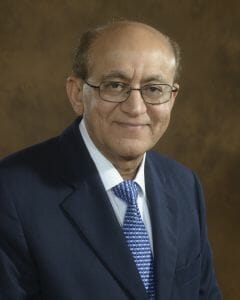 The NAVBO Meritorious Awards Committee and Council is pleased to announce the selection of Rakesh K. Jain, Ph.D., as the 2018 recipient of the Earl P. Benditt Award, in recognition of his numerous contributions to our understanding of the unique characteristics of tumor vasculature. Dr. Jain is currently the Andrew Werk Cook Professor of Tumor Biology (Radiation Oncology) at Harvard Medical School and Director of the Edwin L. Steele Laboratory for Tumor Biology at Massachusetts General Hospital. He will present the Benditt Lecture and receive the award, one of NAVBO's highest honors, at Vascular Biology 2018 in Newport, Rhode Island (October 17, 2018).
The NAVBO Meritorious Awards Committee and Council is pleased to announce the selection of Rakesh K. Jain, Ph.D., as the 2018 recipient of the Earl P. Benditt Award, in recognition of his numerous contributions to our understanding of the unique characteristics of tumor vasculature. Dr. Jain is currently the Andrew Werk Cook Professor of Tumor Biology (Radiation Oncology) at Harvard Medical School and Director of the Edwin L. Steele Laboratory for Tumor Biology at Massachusetts General Hospital. He will present the Benditt Lecture and receive the award, one of NAVBO's highest honors, at Vascular Biology 2018 in Newport, Rhode Island (October 17, 2018).
Following undergraduate studies in Chemical Engineering at the Indian Institute of Technology in Kanpur, Dr. Jain received his M.S. and Ph.D. in Chemical Engineering from the University of Delaware. He held faculty positions in Chemical and Biomedical Engineering at Columbia University and Carnegie Mellon University prior to joining the Harvard faculty in 1991. He has served on a multitude of editorial boards, review panels, and advisory groups. Dr. Jain’s research has been supported steadily for decades by the NIH and other agencies, including the Gates Foundation and Department of Defense. His scholarly contributions, reported in well over 650 publications, book chapters, and reviews, have earned Dr. Jain scores of awards and honors in the U.S. and internationally, including election to the United States National Academies of Medicine (2003), Engineering (2004), and Sciences (2009). He holds seven U.S. patents and received the United States National Medal of Science for 2013.
Dr. Jain is regarded as a trailblazer in the study of tumor microenvironment, examining in detail the notion that the relationships between tumors and their surrounding non-tumor tissue—including blood vessels—are essential determinants of disease progression, therapeutic efficacy, and patient prognosis. Dr. Jain’s nominators note that, in sum, his work has provided “…unprecedented molecular, cellular, anatomical and functional insights into the vascular pathophysiology of tumors, for proposing the seminal hypothesis that antiangiogenic therapy can ‘normalize’ the aberrant vasculature and microenvironment of tumors and thereby improve both delivery and efficacy of treatment of solid tumors.” His studies revealed that the blood and lymphatic vasculature, fibroblasts, immune cells and the extracellular matrix associated with tumors are abnormal, collectively creating a hostile tumor microenvironment characterized by hypoxia, low pH and high interstitial fluid pressure. He and his collaborators subsequently hypothesized that normalizing the microenvironment may improve treatment outcome and subsequently have demonstrated that judicious use of antiangiogenic agents—originally designed to starve tumors—could transiently “normalize” tumor vasculature, alleviate hypoxia, increase delivery of drugs and anti-tumor immune cells, and improve the outcome of various therapies, including immunotherapy. Dr. Jain’s more recent work includes efforts to improve the vascular competence of engineered tissue in the context of regenerative medicine. By generating endothelial and smooth muscle cells from human embryonic stem cells and induced pluripotent stem cells, his lab is bringing functional and durable engineered vessels closer to translation into the clinic.
Please join us for VB2018 in Newport this October to honor Dr. Jain as he receives this well-deserved award. Dr. Jain will give his talk, "Reengineering the tumor microenvironment to improve cancer treatment: Bench to bedside" on October 17, 2018 at 3:15pm in the Grand Ballroom of Gurney's Newport Resort and Marina.
Compiled by William R. Huckle,
NAVBO Editor
2017 NAVBO EARL P. BENDITT AWARD - PETER LIBBY, BRIGHAM & WOMEN'S HOSPITAL, HARVARD MEDICAL SCHOOL
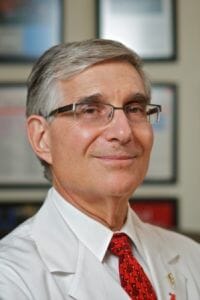
BRIGHAM AND WOMEN'S HOSPITAL CHIEF OF CARDIOVASCULAR MEDICINE AND HARVARD PROFESSOR OF MEDICINE PETER LIBBY, MD
The NAVBO Meritorious Awards Committee and Council are pleased to announce the selection of Peter Libby, M.D., as the 2017 recipient of the Earl P. Benditt Award, in recognition of his numerous significant contributions to elucidating the pathogenesis of atherosclerosis and its complications. Dr. Libby is currently Mallinckrodt Professor of Medicine, Harvard Medical School, serving also as Senior Physician at Brigham and Women’s Hospital and Consulting Physician in the Department of Medical Oncology at the Dana-Farber Cancer Institute. He will present the Benditt Lecture and receive the award, one of NAVBO's highest honors, at Vascular Biology 2017 in Pacific Grove, California (October 15-19, 2017).
Following undergraduate studies in Biochemistry at the University of California-Berkeley, Dr. Libby received his M.D. from UC-San Diego in 1973 and trained thereafter as an intern, resident and fellow at Peter Bent Brigham Hospital and Harvard Medical School. He has held a series of research and clinical positions at Harvard and Tufts University, rising to the rank of Professor of Medicine at Harvard in 1996. He has held leadership positions in numerous clinical trials and served on a multitude of editorial boards, review panels, and advisory groups. Dr. Libby’s research has been supported steadily by the NIH and other agencies for decades, and he serves as the PI of a T32 training grant in cardiovascular research that is in its 32nd year of funding. His scholarly contributions, reported in well more than 350 peer-reviewed publications and over 400 book chapters and reviews, have earned Dr. Libby dozens of honors in the U.S. and internationally, including a MERIT Award from the National Heart, Lung, and Blood Institute (1993-2003), the American Heart Association’s Basic Research Prize, (2011), and a Lifetime Achievement Award from the Heart Failure Association of the European Society of Cardiology (2014).
As a basic scientist, Dr. Libby has achieved worldwide recognition for his laboratory’s important work on the biology of the endothelium, vascular smooth muscle, and their interactions with inflammatory cells. Of particular note is his contribution to our understanding of the roles of CD40 and CD40L, matrix metalloproteinases and soluble inflammatory mediators. Those writing in support of Dr. Libby’s nomination for the Benditt Award laud his willingness to critically evaluate mouse models as predictors of human pathophysiology or fruitful therapeutic approaches. Dr. Libby and his colleagues were the first to discover that vascular wall cells produce pro-inflammatory cytokines and that inflammatory mechanisms change collagen metabolism and control the susceptibility of atheromata to disrupt and cause thrombosis – key elements of our current understanding of the progression of atherosclerotic disease.
Dr. Libby enjoys a stellar reputation as a teacher and mentor and is a highly sought-after speaker both nationally and abroad. His service to NAVBO likewise has been exemplary: as a “founding member,” he has played leadership roles on the Steering and Development Committees, on Council (1994-1996, 2012-2015), and has fostered productive relationships between NAVBO and other organizations with common goals and constituencies, particularly the American Heart Association.
Please join us at Vascular Biology 2017 at the Asilomar Conference Grounds this fall to honor Dr. Libby as he receives this well-deserved award. Dr. Libby will give his talk, "Inflammation in Cardiovascular Disease: A Translational Journey" on October 18, 2017 at 3:15pm in Merrill Hall.
Compiled by William R. Huckle,
NAVBO Editor
2016 NAVBO EARL P. BENDITT AWARD - ELISABETTA DEJANA, UNIVERSITY OF UPPSALA
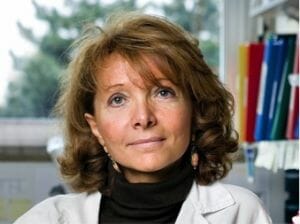 The NAVBO Meritorious Awards Committee and Council are pleased to announce the selection of Elisabetta Dejana, Ph.D.,
The NAVBO Meritorious Awards Committee and Council are pleased to announce the selection of Elisabetta Dejana, Ph.D.,
as the 2016 recipient of the Earl P. Benditt Award, in recognition of her pioneering studies in endothelial cell biology and inflammation. Dr. Dejana is currently Chief of the Angiogenesis Program, Institute of Molecular Oncology, Italian Foundation for Cancer Research (FIRC) in Milan, Italy and professor of Pathology at the Department of Immunology, genetics and Patology, University of Uppsala, Uppsala, Sweden. She will present the Benditt Lecture and receive the award, one of NAVBO's highest honors, at the 19th International Vascular Biology Meeting (October 30-November 3, 2016) in Boston, Massachusetts.
Dr. Dejana received her doctorate in Biological Sciences from the University of Bologna and has held a variety of research and academic posts in Paris, Grenoble, Stockholm, and Milan. She became Chief of the Angiogenesis Program at FIRC in 2000 and was appointed Full Professor of General Pathology in the School of Sciences at the University of Milan in 2002. She has participated on numerous scientific advisory boards, and her research contributions, reported in more than 300 scientific publications, have earned Dr. Dejana awards across Europe and in the US.
Dr. Dejana has achieved international recognition for elucidation of molecular mechanisms by which cells of the vascular endothelium interact with each other, with cells of the immune system, and with the extracellular matrix. These relationships are fundamental to any physiological process involving dynamics of blood vessel structure, including modulation of vascular permeability, angiogenesis or vascular regression, and well-regulated inflammation and hemostasis. These processes are of particular importance in cardiovascular diseases that involve pathologies of immune function, vascular leakage, hemorrhage and thrombosis.
A major contribution from Dr. Dejana’s laboratory has been characterization of the molecular architecture of endothelial cell-cell junctions. Her seminal 1992 paper in the Journal of Cell Biology reported the discovery of VE-cadherin as a key protein component of cell-to-cell adherence junctions. Subsequent research has revealed that formation of VE-cadherin/Β-catenin complexes not only shapes endothelial junctions but also allows transfer of intracellular signals that mediate such important functions such as endothelial tubulogenesis, establishment of polarity, contact inhibition of cell proliferation and inhibition of apoptosis. The impact of these findings throughout the international vascular biology community is evidenced by the appearance of >2100 publications related to VE-cadherin in peer-reviewed journals. In addition to VE-cadherin, Dr. Dejana identified the first member of the junctional adhesion molecule family (JAM-A), a small immunoglobulin-like molecule enriched at endothelial and epithelial cell-to-cell tight junctions. Her lab has found, using approaches of targeted gene modulation and blocking monoclonal antibodies, that JAM-A has a fundamental role in regulating leukocyte and tumor cell transmigration through endothelial cell-to-cell junctions.
More recently, Dr. Dejana’s research has explored the role of defective adherens junction components in Cerebral Cavernous Malformations (CCMs), lesions of the cerebral vasculature that can lead to hemorrhagic stroke and seizure disorders. The architecture of endothelial cell-cell junctions is markedly altered in this disease, producing the vessels that are fragile and with incomplete polarization and poorly formed lumina. The defective junctional components CCM1, -2, and -3 described by Dr. Dejana represent novel biochemical targets underlying this family of disorders, and her experimental systems that model the features of CCMs provide a valuable setting in which testing potential therapeutic compounds.
Please join us at IVBM in Boston this fall to honor Dr. Dejana as she receives this well-deserved award. Dr. Dejana will give her talk, "Transcriptional Regulation of Endothelial Cell Plasticity in Health and Disease" on November 3, 2016 at the International Vascular Biology Meeting in Boston, MA.
Compiled by William R. Huckle,
NAVBO Editor
2015 NAVBO EARL P. BENDITT AWARD - ELI KESHET, HADASSAH MEDICAL SCHOOL, THE HEBREW UNIVERSITY
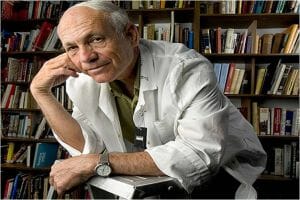 Dr. Keshet will give his talk, "VEGF, Blood Vessels and Stem Cell Niches" on October 21, 2015 at Vascular Biology 2015 in Hyannis, MA on Cape Cod.
Dr. Keshet will give his talk, "VEGF, Blood Vessels and Stem Cell Niches" on October 21, 2015 at Vascular Biology 2015 in Hyannis, MA on Cape Cod.
The NAVBO Meritorious Awards Committee and Council are pleased to announce the selection of Eli Keshet, M.Sc., Ph.D., as the 2015 recipient of the Earl P. Benditt Award, in recognition of his pioneering studies on the regulation of angiogenesis. Dr. Keshet is currently Full Professor in Developmental Biology and Cancer Research at the School of Medicine of the Hebrew University of Jerusalem, Israel. He will present the Benditt Lecture and receive the award, one of NAVBO's highest honors, at Vascular Biology 2015 in Hyannis, Massachusetts, on October 21, 2015.
Dr. Keshet received his B.Sc., M.Sc., and Ph.D. degrees from the Hebrew University. His post-doctoral work included studies in the laboratory of Howard Temin at the University of Wisconsin (1976-79), followed by stints as Senior Scientist and Senior Lecturer at the Weizmann Institute and Hebrew University, respectively. After two years as a Visiting Scientist at the NIH, Dr. Keshet joined the faculty at Hebrew University in 1986, rising to the rank of Full Professor in 1993.
The contributions of Dr. Keshet's research group on Vascular Endothelial Growth Factor (VEGF) can be found throughout the field of vascular biology. Their seminal paper in Nature in 1992 identified hypoxia as key regulator of VEGF expression, only a few short years after the biochemical definition of this key angiogenic agent. Thus, a link was established between the tissue microenvironment and the molecular induction of angiogenesis. As the starting point of molecular hypoxia research, this work led to exploration of hypoxia-inducible factors (HIFs) and prolyl hydroxylases as regulators of gene expression by ischemia. Subsequently, Dr. Keshet identified hormonal regulators of VEGF expression and characterized VEGF as a survival factor for the developing vasculature. His laboratory experimentally modeled retinopathy of prematurity, describing the "front" of invading endothelial cells now conceptualized as the tip cell – stalk cell relationship. His work demonstrating that VEGF withdrawal leads to ablation of immature blood vessels helped establish VEGF as a meaningful target for translational anti-angiogenesis research. More than twenty years into his academic career, Dr. Keshet continues to identify avenues of VEGF research, including identifying a novel splice variant of sVEGFR1 associated with human preeclampsia. More recently, the Keshet lab has described perfusion-independent control of the stereotypic branching of lung airways by blood vessels during development.
Beyond these landmark contributions to our knowledge of vascular biology, Dr. Keshet's nomination for the Benditt Award noted that he is "...a role model... as a person and as a scientist... truly one of the most creative scientists... modest and humble..." "More importantly, his lab is proof of the fact that what counts in science is brains and not manpower or technological power." Please join us at Hyannis in October to honor Dr. Eli Keshet as he receives this well-deserved award.
Compiled by William R. Huckle,
NAVBO Editor
2014 NAVBO EARL P. BENDITT AWARD - JORDAN S. POBER, YALE UNIVERSITY SCHOOL OF MEDICINE
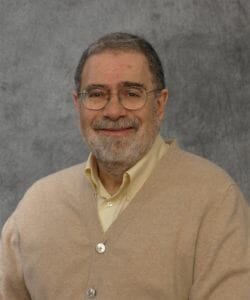 Dr. Pober will give his talk, "Lymphocyte Interactions with the Vessel Wall" on October 22, 2014 at Vascular Biology 2014 in Pacific Grove, CA (Monterey Peninsula).
Dr. Pober will give his talk, "Lymphocyte Interactions with the Vessel Wall" on October 22, 2014 at Vascular Biology 2014 in Pacific Grove, CA (Monterey Peninsula).
The NAVBO Meritorious Awards Committee and Council is pleased to announce the selection of Jordan S. Pober, M.D., Ph.D, as the 2014 recipient of the Earl P. Benditt Award, in recognition of his pioneering work in endothelial cell biology and vascular immunology. Dr. Pober is currently the inaugural Bayer Professor of Translational Medicine, Director of Human and Translational Immunology Program, and Vice-Chair of the Department of Immunobiology for the Section of Human and Translational Immunology at the Yale University School of Medicine. Dr. Pober will present the Benditt Lecture and receive the award, one of NAVBO's highest honors, at Vascular Biology 2014 in Pacific Grove, California, on October 22, 2014.
Dr. Pober received his M.D. and Ph.D. in 1977 from Yale, having performed graduate research under the direction of Lubert Stryer and Jack Strominger, themselves major figures in biochemistry and immunology, respectively. Dr. Pober has remained a leader in the vascular biology field for over 30 years. His important work in the early 1980s demonstrated that cytokines of innate immunity (TNF and IL-1) and of adaptive immunity (IFN-gamma and IL-4) act on human endothelium to induce molecules that mediate interactions with circulating leukocytes including Class I and, unexpectedly, Class II MHC molecules, leukocyte adhesion molecules and chemokines. Based upon these discoveries, Dr. Pober formulated and introduced the concept of endothelial activation. This concept is now a widely accepted paradigm of inflammation, changing our view of the endothelium from a passive barrier to a central and active player in inflammatory processes. In this respect, Dr. Pober's work clearly reaches the ideal of the Benditt Award as recognizing "...an individual who has made an outstanding discovery or developed a concept that has been seminal to our understanding of vascular biology or pathology."
In addition to his influential work in vascular inflammation, Jordan laboratory was one of the first to clone a molecule (PDGF B) from endothelial cells, isolate Weibel-Palade bodies, and define mechanisms of secretion of vonWillebrand Factor. More recently, he has continued to advance important concepts in vascular immunobiology as evidenced by his work on the immunologic causation of graft vasculopathy by cytokines such as IFN-gamma and the generation of synthetic microvessels as a means to improve blood flow. He also continues to make new and interesting observations on how vascular cells may regulate adaptive immune responses through antigen presentation.
In addition to his scholarship, Jordan was both a founding member and former President of NAVBO (1997-1998) and has served the scientific community on numerous editorial boards and study sections. He founded the first interdepartmental program at Yale Medical School in 1991 and has assembled one of the preeminent vascular biology programs in the country. In 2007, he initiated the Human Translational Immunology Program and has continued to recruit and build this important program at Yale to apply the discoveries of immunology to immune modulated diseases in humans such as transplant arteriopathy, diabetes and cancer. Jordan is widely regarded as an outstanding mentor, incredible intellect and invaluable colleague. Please join us at Asilomar to honor Jordan as he receives this well-deserved award in October.
Compiled by William R. Huckle,
NAVBO Editor
2013 NAVBO EARL P. BENDITT AWARD - MICHAEL KLAGSBRUN, HARVARD MEDICAL SCHOOL
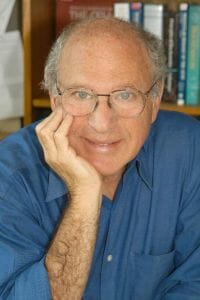 Dr. Klagsbrun gave his talk, "FromFGF to neuropilin: Identifying novel regulators of angiogenesis and cancer" via a pre-recorded video. Dr. Patricia D'Amore was on hand at the meeting to accept the award on his behalf.
Dr. Klagsbrun gave his talk, "FromFGF to neuropilin: Identifying novel regulators of angiogenesis and cancer" via a pre-recorded video. Dr. Patricia D'Amore was on hand at the meeting to accept the award on his behalf.
The NAVBO Meritorious Awards Committee and Council are pleased to announce the selection of Michael Klagsbrun, Ph.D., as the 2013 recipient of the Earl P. Benditt Award, in recognition of his long history of accomplishment in elucidating the role of growth factors in vascular homeostasis and disease. Dr. Klagsbrun will present the Benditt Lecture, "FromFGF to neuropilin: Identifying novel regulators of angiogenesis and cancer," and receive the award, one of NAVBO's highest accolades, at the NAVBO Workshops in Vascular Biology 2013 (October 20-24) in Hyannis, Massachusetts.
Dr. Klagsbrun earned his Ph.D. from the University of Wisconsin-Madison in the laboratory of Robert Bock and pursued post-doctoral training in the Laboratory of Biochemical Pharmacology, in what was then the NIH's Institute of Arthritis, Metabolism, and Digestive Diseases. Following a stint as a staff member at the NIH, he joined the Department of Surgery at Harvard Medical School in 1973 and has remained at that institution ever since, earning the position of Patricia K. Donahoe Professor of Surgery in 2001. Dr. Klagsbrun is currently Senior Associate in Medicine, Vascular Biology Program at Boston Children's Hospital.
Dr. Klagsbrun's laboratory is credited with the first purifications of basic fibroblast growth factor (FGF-2), a potent angiogenic factor, and of heparin-binding EGF-like growth factor (HB-EGF), a potent smooth muscle mitogen. Dr. Klagsbrun's colleagues point to his introduction of heparin-affinity chromatography to the purification of growth factors as a significant accelerator of research into the regulation of cell proliferation in general, and of vascular endothelial mitogenesis in particular.
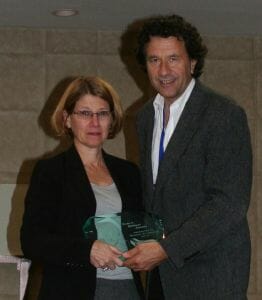 More recently, the Klagsbrun lab has purified and characterized the neuropilin class of vascular growth
More recently, the Klagsbrun lab has purified and characterized the neuropilin class of vascular growth
factor receptors that act as novel receptors for members of the VEGF family of angiogenic factor. Neuropilin was originally described as a receptor for semaphorin, a protein involved in regulating axon guidance. These studies have suggested that similar molecular mechanisms regulate angiogenesis and neuronal guidance, both of which are networking processes whose close regulation is essential during prenatal development. This work, published in Cell, yielded landmark findings that have transformed our view of the role of neuropilin in regulating key biological processes. Since that original study, Dr. Klagsbrun and his group have gone on to demonstrate that VEGF binds both neuropilin and VEGFR-2 to form a ternary complex that enhances VEGF's angiogenic activity. His work with neuropilin knockouts in mice and knockdowns in zebrafish was the first to demonstrate the neuropilins are necessary for angiogenesis. These studies have led to the discovery that members of the class-3 semaphorin family of axon guidance mediators actually inhibit angiogenesis.
In the realm of the EGF receptor family of proteins, Dr. Klagsbrun and his group have found that tumor endothelial cells, unlike normal endothelial cells, express ERbB1 and that EGFR KI inhibits tumor growth partly by blocking tumor endothelial EGFR activity. These studies suggest that it may, in fact, be possible to target tumor blood vessels without affecting the normal vasculature, a finding with significant therapeutic importance.
To quote from a letter of nomination: "It is my opinion that the field of vascular biology would be ten years behind its present accomplishments had it not been for the pioneering and continuing work of Dr. Michael Klagsbrun. ... with nearly 300 publications, many in the very best journals, and the clear credit for developing several new areas within the field of vascular biology, Dr. Klagsbrun's accomplishments should not be underestimated. He is a true pioneer, a creative thinker, a rigorous scientist and one of the great lights of our field."
Compiled by William R. Huckle,
NAVBO Editor
2012 NAVBO EARL P. BENDITT AWARD - BRADFORD C. BERK, UNIVERSITY OF ROCHESTER MEDICAL CENTER
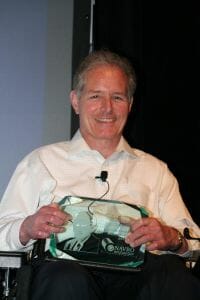 Dr. Berk holds the 2012 jade crystal Earl P. Benditt Award just after giving his talk, "How Many Dynes Make a Good Time?" at the NAVBO Workshops in Vascular Biology 2012 in Monterey, CA
Dr. Berk holds the 2012 jade crystal Earl P. Benditt Award just after giving his talk, "How Many Dynes Make a Good Time?" at the NAVBO Workshops in Vascular Biology 2012 in Monterey, CA
The Earl Benditt Award was presented to Bradford C. Berk, M.D., PhD. at the NAVBO Workshop in Vascular Biology in Asilomar. This award recognized the many contributions that Dr. Berk has made to vascular biology over the duration of his career. His cleverly entitled presentation "How Many Dynes Make a Good Time" integrated his many avenues of investigation. He began his presentation with "Hemodynamics 101", summarizing many years of research by engineers, vascular biologists and physiologists, who have described the roles of shear stress, disturbed blood flow, and the predilection for atherosclerosis to occur at sites of disturbed flow. One of the most intriguing mysteries of mechano transduction is what are the shear stress receptors, and how do they transmit physical forces into biological responses.
A critical atheroprotective biomechanical pathway identified by the Berk laboratory was the MEK5-ERK5 signal transduction cascade in endothelial cells. Steady flow stimulates all of the MAP kinases with the exception of JNK. The Berk lab and many others showed activation of an atheroprotective pathway that involves MEK5- ERK5-PPARg and KLF2 signaling. Steady flow activates both anti-inflammatory and pro-survival pathways, and inhibits pro-inflammatory and death pathways such as those stimulated by TNF. Specifically, the laboratory of Dr. Wang Min and Berk showed that steady flow inhibited Apoptosis Signal Regulated Kinase (ASK1). ASK1 is activated by reactive oxygen species, as well as by TNFa, and leads to apoptosis, endothelial cell dysfunction, and inflammation. Steady flow inhibits ASK1 activation by enhanced interaction of ASK1 with its inhibitor, thioredoxin.
Because there was no change in the amount of thioredoxin, and increase in its activity Dr. Berk's laboratory hypothesized that steady flow decreased a thioredoxin inhibitory protein. This lead to the identification of thioredoxin interacting protein (TXNIP) by down regulating TXNIP under conditions of steady flow. In contrast, disturbed flow increases TXNIP expression. In TXNIP deficient mice, the up regulation of VCAM-1 by TNFa was reduced. Furthermore, endothelial TXNIP expression was increased in areas of disturbed flow (e.g. branch points) in vivo, and increased in vitro by disturbed flow. This increase in TXNIP is also required for leukocyte adhesion. KLF2 reverses TXNIP-induced leukocyte adhesion molecule expression (ICAM, VCAM) and interestingly, disturbed flow inhibits KLF2 promoter activity.
ERK5 also inhibits TNF induced JNK activation, and inhibition of this kinase by an inhibitor (BIX02188) prevents flow inhibition of TNF. Further exploration of the mechanism of ERK5 inhibition lead to the identification of a role for protein kinase C z (PKCz). PKCz is activated by disturbed flow; Berk's laboratory showed that TNF cleaved PKCz generating a catalytically active form, CAT z via activation of caspase 3; and flow inhibited this cleavage as well as caspase-3 activation, thus interrupting a positive feedback loop induced by TNF that would otherwise lead to endothelial apoptosis. PKCz crosstalk with the ERK5-KLF2 pathway thus modulates vascular inflammation. In addition to promoting leukocyte binding to endothelial cells via induction of ICAM, this kinase stimulates endothelial apoptosis via JNK and caspase 3 activation, as well as by stimulating p53 SUMOylation.
Thus flow can stimulate both atheroprotective (MEK5-ERK5-KLF2) and atheropromoting (PKCz-JNK). More recently the laboratories of Abe and Berk have shown that disturbed flow stimulates inflammation and endothelial apoptosis by promoting phosphyloration of ERK5 by PKCz, thereby inhibiting activation of KLF2. Furthermore, TXNIP inhibits KLF2 transcription by acting as a co-repressor of KLF2 gene transcription. Elucidation of the counter-regulatory pathways explains the site specific nature of atherosclerosis, with steady flow promoting anti-inflammatory, vasodilatory and pro-survival signals. In contrast, disturbed flow stimulates pro-inflammatory, vasoconstrictor and pro-death responses.
Dr. Berk acknowledged his many students, post-doctoral fellows, assistants and collaborators who contributed to the work that he presented: Jun-ichi Abe, Keigi Fujiwara, Gwen Garin, Ryan Hoefen, Zheng-Gen Jin, Geun-Young Kim, Rich Lee, Wang Min, Patrizia Nigro, Xinchun Pi, Oded Spindel, James Surapisitchat, Xiaoquin Wang, Chang-Hoon Woo, Cameron World, Hide Yamawaki and Chen Yan.
by Mary Gerritsen
2011 Benditt Awardee
Presented at Vascular Biology 2011 in Hyannis, MA
2010 Benditt Award Recipient
Presented at the 2010 IVBM in Los Angeles, CA
2009 Benditt Award Recipient
Presented at Vascular Biology 2009 in New Orleans
2008 Benditt Award Recipient
Presented at Vascular Biology 2008 in San Diego, CA
2007 Benditt Award Recipient
Presented at Vascular Biology 2007 in Washington, DC
2006 Benditt Award Recipient
Presented at Vascular Biology 2006 in San Francisco, CA
2005 Benditt Award Recipient
Presented at Vascular Biology 2005 in Chicago, IL
2004 Benditt Award Recipient
Presented at the International Vascular Biology Meeting in 2004 in Toronto, Canada
2003 Benditt Award Recipient
Presented at Vascular Biology 2003 in San Diego, CA
2002 Benditt Award Recipient
Presented at the Vascular Biology 2002 in Salt Lake City, UT
2001 Benditt Award Recipient
Presented at Vascular Biology 2001 in Washington, DC
2000 Benditt Award Recipient
Presented at Vascular Biology 2000 in San Diego, CA
First Recipient of the Earl P. Benditt Award Recipient in 1999
Presented at Vascular Biology 1999 in Washington, DC
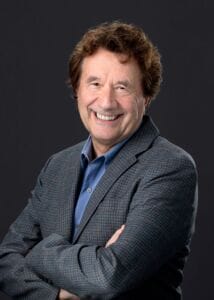
Klaus Ley Recognized with 2025 Stephen Schwartz Award for Outstanding Mentorship
NAVBO’s Meritorious Awards Committee is pleased to name Klaus Ley, M.D., as the 2025 recipient of the Stephen Schwartz Award. Named in honor of Dr. Stephen Schwartz, a revered and beloved member of NAVBO and co-founder of the society, the award recognizes a mentor who has contributed significantly to the successful career of scientists who have trained in their laboratory, as well as served as an exemplary mentor to graduate students and postdocs, and who has contributed to fostering an environment that facilitates both professional and personal growth. The award will be presented on Wednesday, October 22, 2025, at VB2025 in Hyannis, Massachusetts.
Dr. Ley currently serves as Professor of Physiology, Co-Director of the Immunology Center of Georgia, and Georgia Research Alliance Eminent Scholar at the Medical College of Georgia. He completed undergraduate studies in Mathematics and Physics at the Altkönigschule-Gymnasium, Kronberg, Germany and his M.D. at Julius-Maximilians- Universität, Würzburg (1983). He pursued postdoctoral research in Physiology and Biomedical Engineering at the Freie Universität Berlin and UC San Diego, respectively. He held faculty positions at the University of Virginia and UC San Diego prior to relocating to the Medical College of Georgia in 2022.
Known for his laboratory’s major contributions to our understanding of the role of adhesion molecules in control of leukocyte tissue distribution and extravascular vascular trafficking, Dr. Ley also has earned the admiration of trainees and colleagues for his genuine passion for mentorship. Former trainees writing in support of his nomination for the Schwartz Award note that Klaus “…always provides an environment for growth and exploration and encourages independence” and “…supports his trainees' career development in and outside of academia.” “His leadership creates an atmosphere of trust and allows trainees to receive the substance they need to thrive in science.” He has earned the reputation for being ever-available to advisees throughout their association with him, ranging from stages of early experimental design and interpretation of findings to helpful critique of grant applications as former trainees establish their independent scientific identities. And by all measures, Dr. Ley has succeeded royally in fostering career success for those under his supervision: of the scores of doctoral students and greater than 60 postdocs he has mentored, many have earned key positions in academic science and the public and private sectors, in the U.S. and internationally.
Please join us in Hyannis this October to honor 2025 Schwartz Award recipient, Dr. Klaus Ley.
JANUARY 1, 1942–MARCH 17, 2020
STEPHEN SCHWARTZ AWARD PRESENTED BY NAVBO FOR OUTSTANDING MENTORSHIP
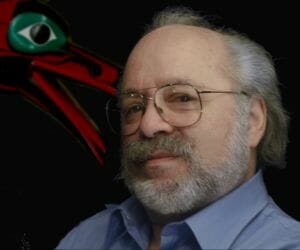 This award recognizes a mentor that has contributed significantly to the successful career of scientists who have trained in their lab; who has served as an exemplary mentor to graduate students and postdoctoral fellows and contributed to fostering an environment which facilitates both professional and personal growth.
This award recognizes a mentor that has contributed significantly to the successful career of scientists who have trained in their lab; who has served as an exemplary mentor to graduate students and postdoctoral fellows and contributed to fostering an environment which facilitates both professional and personal growth.
Recipients:
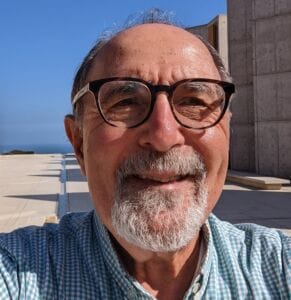
Mark Ginsberg Recognized with 2024 Stephen Schwartz Award for Outstanding Mentorship
NAVBO’s Meritorious Awards Committee is pleased to name Mark Ginsberg, M.D., as the 2024 recipient of the Stephen Schwartz Award. Named in honor of Dr. Stephen Schwartz, a revered and beloved member of NAVBO and co-founder of the society, the award recognizes a mentor who has contributed significantly to the successful career of scientists who have trained in their laboratory, as well as served as an exemplary mentor to graduate students and postdocs, and who has contributed to fostering an environment that facilitates both professional and personal growth. The award was presented on Wednesday, October 23, 2024, at VB2024 in Pacific Grove, California.
Dr. Ginsberg currently serves as Distinguished Professor in the Department of Medicine, University of California, San Diego. He completed undergraduate studies in Physiological Psychology at McGill University in Montreal, where he was a University Scholar. He was awarded an MD summa cum laude from the State University of New York, Downstate Medical Center. Internship and residency in internal medicine followed at the University of Chicago (1970-73), and from 1973-75 he pursued postdoctoral studies in rheumatology at the same institution. Dr. Ginsberg moved to The Scripps Research Institute as a postdoctoral fellow in 1975 and joined the Cell Biology faculty there in 1978, eventually reaching the rank of full professor in the Departments of Vascular Biology and Cell Biology. In 2004, he relocated his laboratory to the University of California, San Diego. He is the author of more than 300 original scientific publications, largely devoted to the study of cell adhesion mechanisms. Dr. Ginsberg’s numerous honors include Research Career Development and MERIT Awards from the NIH and a Distinguished Career Award from the International Society for Thrombosis and Haemostasis. Closer to home, Dr. Ginsberg served as President of NAVBO in 2007-08 and received the organization’s Earl P. Benditt Award in 2003.
Throughout his career, Dr. Ginsberg has prioritized the training of the next generation of scientists, as evidenced by his having mentored >50 post-doctoral fellows with Ph.D. and/or M.D. degrees that are still active in research. He is an active member of the Biomedical Sciences Graduate Training Program at USCD and directed the Physician Scientist Training Pathway at that institution for 10 years. Moreover, he served as Program Director of T32 post-doctoral training programs at Scripps and UCSD for nearly 30 years in total.
Dr. Ginsberg’s trainees credit their experience under his mentorship as being pivotal in their subsequent success. “In Mark’s lab, I benefited tremendously from his superb guidance, outstanding research expertise and environment and his generosity of encouraging me to develop an independent research project,” writes one. “Mark’s lab provides an encouraging environment of critical thinking and new ideas.” Notes another, “Mark is also an excellent judge of how much independence to provide to trainees – I was afforded lots of freedom with just the right amount of guidance to push me along the right track.” “Beyond his lab., Mark was incredibly helpful as I navigated the transition to my own faculty position. He offered wise and helpful advice as I narrowed down offers and selected my job and continued to offer help and advice as I established my independent program after leaving his lab.” Perhaps most significantly: ”He considers the success of his trainees a personal mission of his own lengthy career in science, and is dedicated to providing guidance and support throughout their careers.”
Please join us at Asilomar this October to honor 2024 Schwartz Award recipient, Dr. Mark Ginsberg.
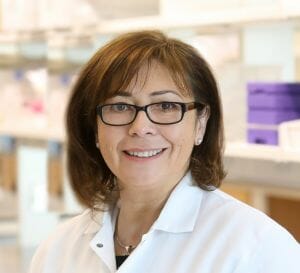
Luisa Iruela-Arispe - 2023 Recipient of the Stephen Schwartz Award
Supported by Vascular Pharmacology
NAVBO’s Meritorious Awards Committee is pleased to name Luisa Iruela-Arispe, M.S., Ph.D., as the 2023 recipient of the Stephen Schwartz Award. Named in honor of Dr. Stephen Schwartz, a revered and beloved member of NAVBO and co-founder of the society, the award recognizes a mentor who has contributed significantly to the successful career of scientists who have trained in their laboratory, as well as served as an exemplary mentor to graduate students and postdocs, and who has contributed to fostering an environment that facilitates both professional and personal growth. The award will be presented in October 2003, at VB2022 in Newport, RI.
Dr. Iruela-Arispe is currently the Stephen Walter Ranson Professor of Cell Biology and Chair of the Department of Cell and Developmental Biology at Northwestern University. She earned an undergraduate degree in Biology at the Universidade Gama Filho, Rio de Janeiro, Brazil, an M.S. in Histology & Embryology at the Universidade Federal de Rio de Janeiro, and completed her PhD in Cell & Molecular Biology between Universidade de São Paulo and the University of Washington (1989). Following post-doctoral study at the University of Washington, she held faculty positions at Harvard Medical School and the University of California-Los Angeles, becoming full Professor at UCLA in 2003. She served in a series of leadership positions at UCLA before relocating to Northwestern as Professor and Chair in 2019.
Dr. Iruela-Arispe’s research, which seeks to better understand signaling events that control vascular development and (dys)function, has been extraordinarily productive, evidenced by continuous grant support and well over 200 peer-reviewed publications. As a leading biomedical researcher, since 1994 she has guided 19 students to doctoral degrees in her laboratory and mentored 22 postdoctoral fellows, all of whom have found gainful employment in academia, publishing, or industry.
Her commitment to diversifying the research environment is evident: of her 41 doctoral or post-doctoral trainees, 75% are women; 41% are from underrepresented groups, and 53% are first-generation in pursuing higher education. She was recognized with a prestigious Distinguished Teaching Award for excellence in teaching at UCLA in 2009 and in 2013 received the UCLA Gold Shield Faculty Prize. In 2002 she led the creation of a graduate training program in Vascular Biology that has enjoyed continuous NIH T32 award support ever since. From 2011-2019, Dr. Iruela-Arispe served as Director of UCLA’s Molecular Biology Interdepartmental Program, an experience she credits with increasing both her understanding of mentorship and her sense of responsibility for guiding the next generation of scientists. Not least among her accomplishments, Luisa received NAVBO’s inaugural Judah Folkman Award in 2009 for excellence in research and service to the vascular biology community.
While the research productivity and recognition by peers are indirect reflections of Dr. Iruela-Arispe’s devotion to mentorship, the observations of those who have benefitted from her guidance are compelling indeed, revealing her fostering development of both technical expertise and transferrable professional skills. A trainee writing in support of the nomination considers themselves “…extremely blessed to have such a fiercely dedicated mentor in my corner. She is a role model for all young scientists as both an innovative scientist and dedicated educator who fosters excellence on a personal and institutional level.” “Dr. Arispe is consistently striving to promote inclusivity and an atmosphere that engenders collaborations and interactions by recruiting a group of highly diverse (expertise, level of training and ethnicity) and sociable trainees.” Another writes: “Luisa’s mentoring philosophy is built on the foundation of strong communication and respect for the individual. She goes above and beyond for her trainees and truly makes an effort for them to feel seen and heard. Additionally, the graduate students in my program also viewed her as their second mentor, which was very endearing.”
Please join us in Newport this October to honor 2023 Schwartz Award recipient, Dr. Luisa Iruela-Arispe.
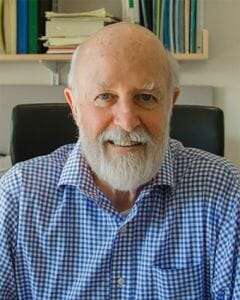
NAVBO’s Meritorious Awards Committee is pleased to name Richard Hynes, PhD, as the 2022 recipient of the Stephen Schwartz Award. Named in honor of Dr. Stephen Schwartz, a revered and beloved member of NAVBO and co-founder of the society, the award recognizes a mentor who has contributed significantly to the successful career of scientists who have trained in their laboratory, as well as served as an exemplary mentor to graduate students and postdocs, and who has contributed to fostering an environment which facilitates both professional and personal growth. This year’s award is being supported by Barbara Schwartz and family. The award will be presented on Sunday, October 16, 2022, at the 22nd International Vascular Biology Meeting.
Dr. Hynes is currently the Daniel K Ludwig Professor of Cancer Research at MIT. He earned an undergraduate degree in Biochemistry at Cambridge University and completed his PhD in Biology at MIT in 1974. Following postdoctoral study at the Imperial Cancer Research Fund in London, he joined the biology faculty at MIT in 1975. He held leadership positions in Biology and MIT’s Center for Cancer Research and was a Howard Hughes Medical Institute Investigator for over 20 years. He assumed the Ludwig Professorship in 1999.
Dr. Hynes has had an extraordinarily productive career as a life science researcher, evidenced by >400 publications, continuous grant support, and numerous awards (including the 2010 Earl P. Benditt Award from NAVBO). Beyond these achievements, Dr. Hynes has served multiple succeeding generations of scientists as a conscientious mentor, counting well over 100 graduate students, postdocs, and visiting scholars from across the globe among his trainees. The record of accomplishment of these trainees, many of whom are well-recognized leaders in their fields and of organizations like NAVBO, speaks volumes of his effectiveness as a mentor.
One of Dr. Hynes’s nominators, one of his former trainees, notes that “…Richard embodies what one could call an ideal mentor. Someone who allows room for growth and development, who is always honest yet never puts you down, someone who inspires to be a better scientist and a better person.” Moreover, “Richard's mentorship also extends to people he did not train directly. His goodwill, generosity, and empathy are examples of personhood that I strive to emulate and pay it forward.” Another former trainee observed that “From the beginning, he taught us to be critical thinkers and imaginative scientists. He never laid boundaries and allowed us all to make discoveries in a way that, I realize now, is uncommon for a scientist of his caliber.” “Even after leaving his lab, he would always continue to support and guide our successes as independent scientists with little to no tangible benefit to himself. That’s a very special quality and should be recognized and commended at the highest level.” The common threads running through the letters of support for Dr. Hynes included his fairness, unflappable demeanor, his attention to equity, and preparing female trainees to face the challenges they may encounter as women in science.
Please join us in Oakland this October to honor 2022 Schwartz Award recipient Dr. Richard Hynes.
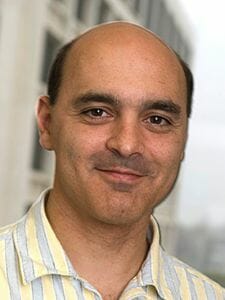
Part of NAVBO’s 2021 Vascular Biology annual meeting festivities will be presenting the first annual 2021 Stephen Schwartz award to this year’s recipient. Named in honor of Dr. Stephen Schwartz, a revered and beloved member of NAVBO and co-founder of the society, the award recognizes a mentor who has contributed significantly to the successful career of scientists who have trained in their laboratory, as well as served as an exemplary mentor to graduate students and postdocs, and who has contributed to fostering an environment which facilitates both professional and personal growth. The award will be presented on Thursday October 28th.
This year’s honor is being presented to Dr. Brant M. Weinstein, who is currently Associate Scientific Director at the National Institute of Child Health and Human Development at the National Institute of Health (NIH) in Bethesda, Maryland. Dr. Weinstein has been a NAVBO member since 1997 and has served on its Membership Committee, Governing Council, and as President.
Dr. Weinstein received his B.S. from the University of Michigan and his PhD from the Massachusetts Institute of Technology (MIT). His research and professional experience include studying vascular and hematopoietic development in the zebrafish as a postdoctoral associate in the laboratory of Dr. Mark Fishman from Harvard University; being the Director of the program in Genomics of Differentiation for the NIH; as well as being an Adjunct Faculty Member for Computational Biology, Bioformatics and Genomics Program at the University of Maryland, a position he still holds. Since 2004 Dr. Weinstein has also served as the Senior Investigator and Head of the Section on Vertebrate Organogenesis at the NIH’s Laboratory of Molecular Genetics/Program of Genomics of Differentiation.
Besides NAVBO, Dr. Weinstein is also a member of the Society for Developmental Biology, the American Heart Association, and the Genetics Society of America. He has been publishing his research since 1990 and has written over 300 manuscripts, reports, books, monographs, posters, and presentations.
Praise for Dr. Weinstein’s ability to mentor was widespread among NAVBO members. Here are some selected quotes from Dr. Weinstein’s nominators:
“Some of the features that make Dr. Weinstein a unique, outstanding, and cherished mentor are his dedication to each one of his trainees, his patience and generosity, the high respect he provides to each one of the people he works with and his advocacy to make science a diverse and welcoming space for everyone.”
“As a PhD student who is about to graduate, I now see that Dr. Weinstein’s mentorship style is rare in the scientific community. His ability to provide significant input without micromanaging and calmly think through problems with his lab members is something that I have seldom seen since leaving the NIH.”
“As a woman of an underrepresented minority in STEM, I have encountered senior scientists that challenge your place in academia. Having Dr. Weinstein as a mentor has been the exact opposite. Despite his worldwide reputation, he respects you as a person and recognizes you as a fellow scientist. When I fell short of ideas or confidence, he found a way to encourage me to become better, to work harder, and guide me toward the right path. It is remarkable how a short one-on-one meeting with Dr. Weinstein can boost your morale and make you feel you can do this job, and you can do it right, because you belong, and you deserve to be here. Under Dr. Weinstein’s guide I have grown as a scientist, published high impact papers, was recognized in the vascular and developmental biology field, and successfully applied to several instrumental grants that will shape my future independent career.”
“To me what makes a good mentor is not that the person is available for questions, easy to communicate with, or pats you on the shoulder to tell you that you are doing well (all of which describe Dr. Weinstein by the way). To me what makes a good mentor is someone who can show what you, as a trainee, are capable of. One of Dr. Weinstein’s greatest attributes as a mentor was letting us, as his trainees, make mistakes, learn from them, and come out of the experience not feeling less than who we are.”
To be considered for the Stephen Schwartz award NAVBO’s Meritorious Awards Committee accepts between two and four letters from trainees (nominators) of the nominee. The letters need to include:
• How the nominee provided an environment for growth and exploration and encouraged independence
• How the nominee provided guidance in different areas (authoring papers, setting up a lab, developing careers)
• Examples of the nominee providing leadership
• A listing of some highly successful proteges of the
nominee
After reviewing the list of nominees, the Meritorious Awards Committee meets to decide who will be the recipient.
NAVBO congratulates Dr. Weinstein on his award. It is well deserved, and Dr. Weinstein is a prime example of how
important mentoring is in the life sciences.
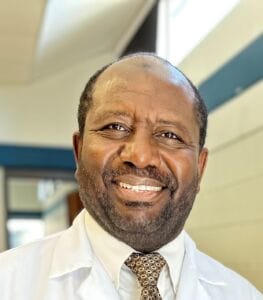
Mahdi Garelnabi to Receive the 2025 Florence R. Sabin Award
NAVBO’s Meritorious Awards and Growth & Enrichment Committees are pleased to name Mahdi Garelnabi, M.Sc, Ph.D.., as the 2025 recipient of the Florence R. Sabin Award. The Sabin Award recognizes a unique individual who embodies the spirit of Dr. Florence Sabin (1871-1953), who broke scientific and social barriers with her research and community engagement. Sabin was known as a brilliant scientist, a trailblazer and role model for women in the medical profession and a steadfast believer in professional opportunities for women. The award is open to members of cardio/vascular biology communities who have worked as scientists, physicians, or physician/scientists.. This year’s award will be presented to Dr. Garelnabi on Wednesday, October 22, 2025, at VB2025 in Hyannis, Massachusetts.
Dr. Garelnabi currently serves as an Associate Professor, Department of Biomedical & Biomedical & Nutritional Science at UMass Lowell. In addition to managing his own research program at Lowell focused on relationships among lipid metabolism, inflammation, and the pathophysiology of vascular disease, Dr. Garelnabi serves as the Director for the Core Lab of the UMass Lowell Center for population Health. He has mentored some 50 undergraduate students and greater that 50 graduate students and post-docs, earning awards in teaching and professional service from the Association for Diagnostics & Laboratory Medicine and his home institution.
Dr. Garelnabi earned a B.Sc. in Biology from Khartoum University, an M.Sc. in Clinical Biochemistry from Bombay University, and Ph.D. from Delhi University (2001). He pursued post-doctoral work with Virgil Brown at Emory University and served in research posts at Ohio State and Siemens Healthcare Diagnostics prior to joining the faculty at UMass Lowell in 2009.
Colleagues writing in support of Dr. Garelnabi’s nomination for the Sabin Award note his dedication to student success and sensitivity to the strengths and needs of each trainee. The impact of his efforts “…extends beyond rhetoric to meaningful, action-driven initiatives that have created lasting change in academia.” With a focus on mentorship, he has provided professional guidance to students and junior faculty members that has been instrumental in their achieving success in their respective fields – truly exemplary of the spirit of the Sabin Award.
Please join us in Hyannis this October to honor Dr. Garelnabi as NAVBO’s 2025 Florence R. Sabin Award recipient.
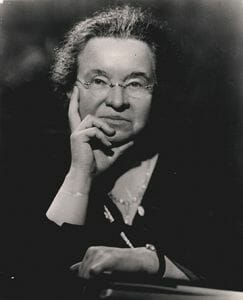
Photo courtesy of Smith College
The Florence R. Sabin Award recognizes a unique individual who embodies the spirit of Dr. Florence Sabin (1871-1953) who broke scientific barriers with her research and contributions in the field of Vascular and Lymphatic Biology, as well as various social barriers. In addition to her contributions to science, Florence Sabin's later work as a public health administrator left a permanent imprint upon the communities in which she served. Sabin’s accomplishments include becoming the first woman faculty member at Johns Hopkins School of Medicine and its first female full professor, the first woman to be elected President of the American Association of Anatomists, and the first woman elected to membership in the National Academy of Sciences. One of her most passionate causes was the advancement of equal rights for women in education, employment, and society in general. Sabin was known as a brilliant scientist, a trailblazer and role model for women in the medical profession and a steadfast believer in equal opportunities for women, a teacher, a colleague, and a friend. Click here to learn more about Florence Sabin.
This annual award is open to active or retired members of the national or international vascular or cardiovascular biology communities who work or have worked as scientists, physicians, or physician/scientists. In addition to their scientific/clinical accomplishments, candidates must have distinguished themselves in at least one of the following areas: promoting social issues which benefit public health, or supporting/providing public service to the broader community.
To nominate a colleague for this award, please see additional information under Nominations on this web site
Recipients:
Manu Platt Received the 2024 Florence R. Sabin Award
Dr. Manu Platt currently serves as Director of the NIH-wide Center for Biomedical Engineering Technology Acceleration (BETA Center), housed within the National Institute of Biomedical Imaging and Bioengineering (NIBIB) Intramural Research Program. The BETA Center, launched in early 2023, seeks to support NIH researchers across disciplines in the development, validation and dissemination of cutting-edge technologies. As the BETA Center director, Dr. Platt works to expand opportunities for biomedical engineering training and professional growth.
Dr. Platt earned a B.S. in Biology from Morehouse College in Atlanta (2001) and a Ph.D. in Biomedical Engineering at the Georgia Institute of Technology and Emory University in Atlanta (2006). He pursued postdoctoral studies in Biological Engineering at MIT and joined the faculty of the Walter H. Coulter Department of Biomedical Engineering at the Georgia Institute of Technology and Emory University in 2008. He rose to the rank of full Professor in 2021 and served as Georgia Research Alliance Distinguished Cancer Scientist and Deputy Director, Interdisciplinary Bioengineering Graduate Program at Georgia Tech.
As a scientific investigator, Platt has received steady research support from the NIH, the NSF, the International AIDS Society and the Georgia Cancer Coalition, among other public and private research institutions. He has served on numerous review committees at NIH, is a member the Biomedical Engineering Society board of directors and is a former member of the NIBIB National Advisory Council for Biomedical Imaging and Bioengineering. Platt is the recipient of numerous awards and honors, including the NIH Director New Innovator award, and an American Association for the Advancement of Science Mentor award.
The Sabin Award was presented to Dr. Platt at Vascular Biology 2024 in Pacific Grove, California on October 20, 2024.
 Naomi Chesler Received the 2023
Naomi Chesler Received the 2023
Florence R. Sabin Award
NAVBO named Naomi Chesler, M.Sc., Ph.D., as the 2023 recipient of the Florence R. Sabin Award. The Sabin Award recognizes a unique individual who embodies the spirit of Dr. Florence Sabin (1871-1953).
Dr. Chesler presently serves as a Professor in the Department of Biomedical Engineering at the University of California, Irvine, and Director of the Edwards Lifesciences Foundation Cardiovascular Innovation and Research Center. She earned a B.Sc. in General Engineering at Swarthmore College, an M.Sc. in Mechanical Engineering at MIT, and her Ph.D. in the Harvard-MIT Medical Engineering and Medical Physics program (1996). Following post-doctoral studies in Vascular Biomechanics at Georgia Tech, she held faculty positions at the University of Vermont (where she earned an NSF CAREER Award) and the University of Wisconsin-Madison, rising to the rank of Professor in Biomedical Engineering at the latter institution in 2014. She assumed her current post at UC-Irvine in 2020.
Dr. Chesler’s well-funded research has focused on the biomechanics and energetics of pulmonary vascular function and right ventricular failure, resulting in over 130 publications. Alongside these laboratory research accomplishments, Dr. Chesler and colleagues have made significant contributions to the scholarship of teaching and mentorship. Their development of “engineering virtual internships,” which provide meaningful engineering experiences to early learners, has the great potential to encourage students in the physical sciences to pursue engineering degrees. Her work has been recognized by the McDonald Mentoring Award from the American Society of Mechanical Engineers (2019), and the Professional Impact Award for Mentoring from the American Institute for Medical and Biological Engineering (2021).
Those writing in support of Dr. Chesler’s nomination were united in their admiration. Dr. Chesler’s selfless desire to see her junior colleagues flourish was evident: “Naomi has been an outstanding mentor to me, consistently providing advice and actions that advanced my career when I needed it most. She did all this with no ulterior motive, as my success has no impact on her own career. I have also seen firsthand how Naomi’s mentoring has affected so many others in the biomechanics community.”
The 2023 Sabin Award was presented to Dr. Chesler at Vascular Biology 2023, in Newport, RI.
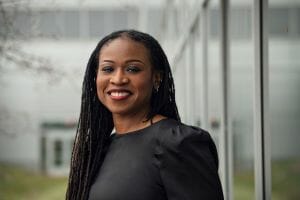
Omolola Eniola-Adefeso – Inaugural Sabin Award Recipient
Supported by Regeneron
NAVBO namee Omolola Eniola-Adefeso, PhD, as the 2022 recipient of the Florence R. Sabin Award. The Sabin Award recognizes a unique individual who embodies the spirit of Dr. Florence Sabin (1871-1953).
At the time of the award, Dr. Eniola-Adefeso served as the Associate Dean for Graduate and Professional Education in the College of Engineering at the University of Michigan. She was also a Professor in the Departments of Chemical Engineering and Biomedical Engineering, Macromolecular Science & Engineering. She earned MSE and PhD degrees in Chemical and Biomolecular Engineering from the University of Pennsylvania. Following post-doctoral study in immunology and leukocyte biology at the Baylor College of Medicine, she joined the Michigan faculty in 2006, rising to the rank of Professor in 2017. Her research interests remain related to immune cell behavior in inflammation and the potential of vascular-targeted carriers as intravascular drug-delivery vehicles.
Dr. Eniola-Adefeso is currently Dean of Engineering and Professor in Biomedical Engineering at the University of Illinois, Chicaogo.
The First Florence Sabin Award was presented to Dr. Eniola-Adefeso at the 2022 International Vascular Biology Meeting in Oakland, California, on October 13, 2022.
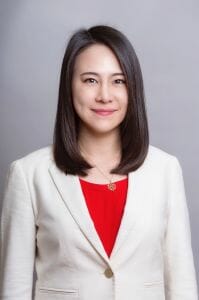
2024 SPRINGER JUNIOR INVESTIGATOR AWARD - NAVBO'S AWARD FOR JUNIOR FACULTY
Mingxia Gu, M.D., Ph.D.
Cincinnati Children's Hospital Medical Center
Dr. Gu will present her talk, "Deciphering Endothelial Organ Specification in Vascularized Organoids," at Vascular Biology 2024 on October 23.
This award recognizes a Junior Faculty, who is within five years of their first independent investigator position or within five years of an independent research position in academia, government, or industry. An applicant must be submitting and presenting an abstract at the upcoming annual meeting. The award recipient will present their abstract in a 20-minute presentation usually within the Award Lecture session.
For the 2025 award, the first appointment needs to be January 1, 2020 or later.
Please note: A first independent investigator is defined as an Assistant Professor or in non-academia, Staff Scientist or equivalent.
THE SPRINGER JUNIOR INVESTIGATOR AWARD IS MADE POSSIBLE BY SUPPORT FROM ANGIOGENESIS
Past Recipients include:
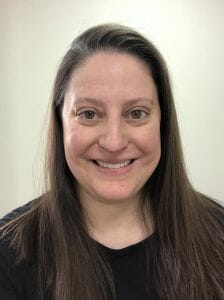
2023 SPRINGER JUNIOR INVESTIGATOR AWARD - NAVBO'S AWARD FOR JUNIOR FACULTY
Amber Stratman, Ph.D.
Washington University in St. Louis
Dr. Stratman presented her talk, "Hemodynamic regulated genes that alter vascular development," on October 18th at Vascular Biology 2023.
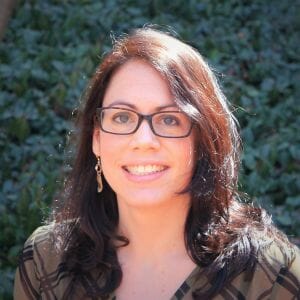
2022 SPRINGER JUNIOR INVESTIGATOR AWARD - NAVBO'S AWARD FOR JUNIOR FACULTY
Delphine Gomez, Ph.D.
University of Pittsburgh
Dr. Gomez presented her talk, H3K4me2 regulates microvascular SMC recruitment and coverage during hindlimb ischemia-induced angiogenesis, at the 22nd International Vascular Biology Meeting on October 16, 2022.
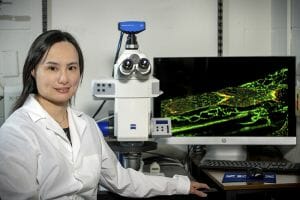
2021 SPRINGER JUNIOR INVESTIGATOR AWARD - NAVBO'S AWARD FOR JUNIOR FACULTY
Ying Yang, Ph.D.
University of South Florida
Dr. Yang presented her talk, Foxo1 Deletion Promotes the Growth of New Lymphatic Valves, at Vascular Biology 2021 on Friday, October 29th.
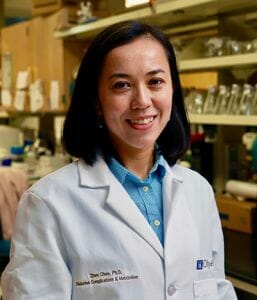
2020 SPRINGER JUNIOR INVESTIGATOR AWARD - NAVBO'S AWARD FOR JUNIOR FACULTY
Zhen Chen, Ph.D.
City of Hope
Dr. Chen presented her talk, Suppression of endothelial AGO1 promotes adipose tissue browning and improves metabolic dysfunction, at Vascular Biology 2020 on Thursday, October 29 at 10:15amET
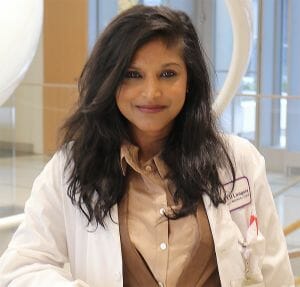
2019 SPRINGER JUNIOR INVESTIGATOR AWARD - NAVBO'S AWARD FOR JUNIOR FACULTY
Bhama Ramkhelawon, Ph.D.
New York University Langone Medical Center
Dr. Ramkhelawon will present her talk, Lung-derived HMGB1 activates proteolytic activity of arterial macrophages and promotes pathological vascular remodeling, at Vascular Biology 2019 on Wednesday, October 30 at Asilomar in Monterey, CA.
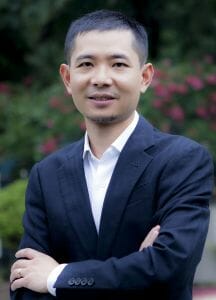
2018 SPRINGER JUNIOR INVESTIGATOR AWARD - NAVBO'S AWARD FOR JUNIOR FACULTY
Yi Fan, M.D., Ph.D.
University of Pennsylvania
Dr. Fan presented his talk, Wnt-mediated endothelial transformation into mesenchymal stem cell-like cells induces chemoresistance in glioblastoma, at Vascular Biology 2018 on Wednesday, October 17 at Gurney's Newport Resort and Marina in Newport, RI.
2017 SPRINGER JUNIOR INVESTIGATOR AWARD - NAVBO'S AWARD FOR JUNIOR FACULTY
Babak Razani, M.D., Ph.D.
Washington University in St. Louis
Dr. Razani presented his talk, Dissecting the impact of dietary protein on macrophage mTOR signaling and atherosclerosis, at Vascular Biology 2017 on Wednesday, October 18 at the Asilomar Conference Grounds in Monterey, CA.
 2016 SPRINGER JUNIOR INVESTIGATOR AWARD
2016 SPRINGER JUNIOR INVESTIGATOR AWARD
Stefania Nicoli, Ph.D.
Yale University
Presented her talk, "Mutagenesis of microRNA genes uncovers trait variance as a unique vascular phenotype that confers stress sensitization" on Thursday, November 3 at the 19th International Vascular Biology Meeting in Boston, MA.
 2015 SPRINGER JUNIOR INVESTIGATOR AWARD
2015 SPRINGER JUNIOR INVESTIGATOR AWARD
Daniel Greif, Ph.D.
Yale University
Presented his talk, "Novel smooth muscle cell progenitors are primed to muscularize in disease" on Wednesday, October 21 at Vascular Biology 2015 in Hyannis, MA.
 2014 SPRINGER JUNIOR INVESTIGATOR AWARD
2014 SPRINGER JUNIOR INVESTIGATOR AWARD
Jason E. Fish, Ph.D.
University of Toronto
Presented his talk, "Endothelial cells reprogram monocyte inflammatory responses through secretion of microvesicles containing anti-inflammatory microRNAs" on Wednesday, October 22 at Vascular Biology 2014 in Monterey, CA.
 2013 SPRINGER JUNIOR INVESTIGATOR AWARD
2013 SPRINGER JUNIOR INVESTIGATOR AWARD
Hyung J. Chun, M.D.
Yale University School of Medicine
Dr. Chun is congratulated by Dr. Mark Ginsberg. Yung presented his talk, "Transcriptional regulation of microRNAs 424 and 503 by MEF2 and PPAR-gamma in the endothelium: Role in pathogenesis of pulmonary arterial hypertension" on Thursday, October 24 at Vascular Biology 2013 in Hyannis, MA.
 2012 SPRINGER JUNIOR INVESTIGATOR AWARD:
2012 SPRINGER JUNIOR INVESTIGATOR AWARD:
Lorin E. Olson, Ph.D.
Oklahoma Medical Research Foundation
Dr. Olson presented a lecture entitled, "PDGF signaling regulates smooth muscle differentiation and accelerates atherosclerosis," at the NAVBO Workshops in Vascular Biology 2012 on October 18 at the Asilomar Conference Grounds, Pacific Grove, CA
 2011 MARKED THE INAUGURAL PRESENTATION OF THIS AWARD.
2011 MARKED THE INAUGURAL PRESENTATION OF THIS AWARD.
Dr. Carlos Fernandez-Hernando of New York University is congratulated by former mentor, William Sessa. Dr. Fernandez-Hernando presented his talk, "miR-33a/b Contributes to the Regulation of Fatty Acid Metabolism and Insulin Signaling," on Thursday, October 20, 2011 at the NAVBO Workshops in Vascular Biology (Hyannis, MA).
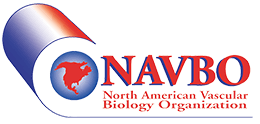
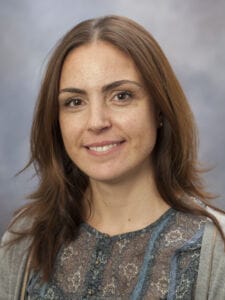 2025 Recipient of the Judah Folkman Award in Vascular Biology
2025 Recipient of the Judah Folkman Award in Vascular Biology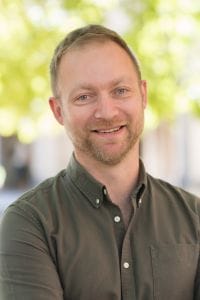 2024 Recipient of the Judah Folkman Award in Vascular Biology
2024 Recipient of the Judah Folkman Award in Vascular Biology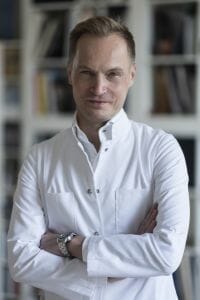 2023 Recipient of the Judah Folkman Award in Vascular Biology
2023 Recipient of the Judah Folkman Award in Vascular Biology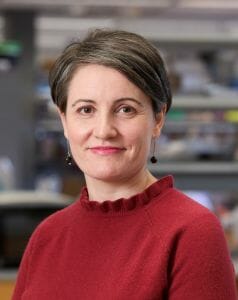 2022 Recipient of the Judah Folkman Award in Vascular Biology
2022 Recipient of the Judah Folkman Award in Vascular Biology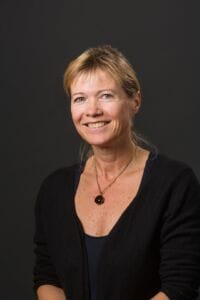 2025 Recipient of the Earl P. Benditt Award
2025 Recipient of the Earl P. Benditt Award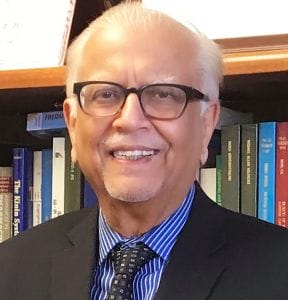 2024 Recipient of the Earl P. Benditt Award
2024 Recipient of the Earl P. Benditt Award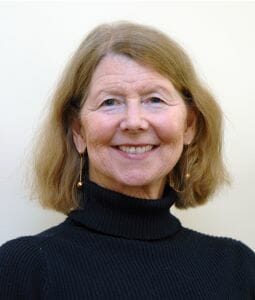 2022 Recipient of the Earl P. Benditt Award
2022 Recipient of the Earl P. Benditt Award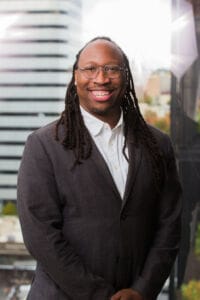
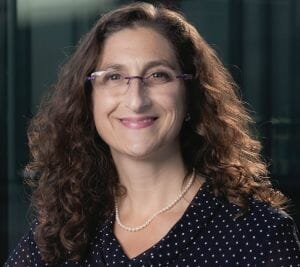 Naomi Chesler Received the 2023
Naomi Chesler Received the 2023
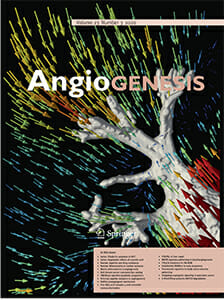
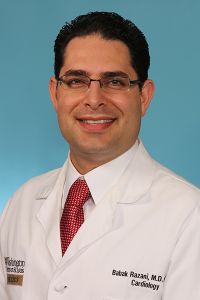
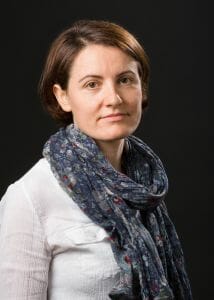 2016 SPRINGER JUNIOR INVESTIGATOR AWARD
2016 SPRINGER JUNIOR INVESTIGATOR AWARD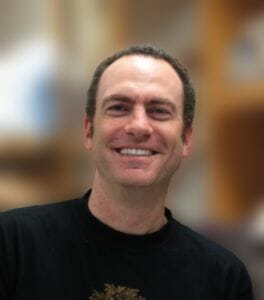 2015 SPRINGER JUNIOR INVESTIGATOR AWARD
2015 SPRINGER JUNIOR INVESTIGATOR AWARD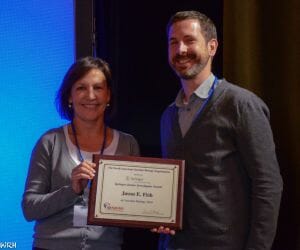 2014 SPRINGER JUNIOR INVESTIGATOR AWARD
2014 SPRINGER JUNIOR INVESTIGATOR AWARD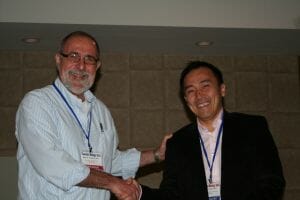 2013 SPRINGER JUNIOR INVESTIGATOR AWARD
2013 SPRINGER JUNIOR INVESTIGATOR AWARD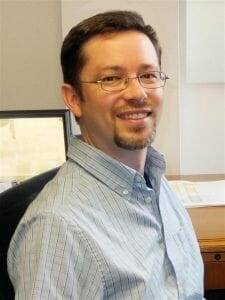 2012 SPRINGER JUNIOR INVESTIGATOR AWARD:
2012 SPRINGER JUNIOR INVESTIGATOR AWARD: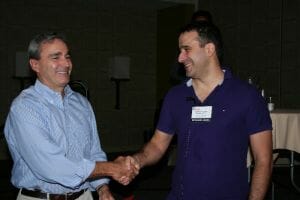 2011 MARKED THE INAUGURAL PRESENTATION OF THIS AWARD.
2011 MARKED THE INAUGURAL PRESENTATION OF THIS AWARD.